#I’ll release a YouTuber apology
Note
i should've expected you to say some gay shit man
u don’t go on the gay blog to ask about a conventionally attractive fictional character and expect not to get some gay shit as an answer 🙄
3 notes
·
View notes
Text
HI!!! After finishing Disco Elysium I wanted to read Sacred and Terrible Air, but there were two issues:
1. It’s not officially released in English
2. I don’t like staring at pdfs!
So I did what any sane person would do. That is take three days of my life printing and binding it.
TRANSLATION (“thank you Group Ibex” we all say in unison!):
PROCESS PICS:
I apologize in advance for anyone who has experience in this sort of thing this is so botched.
I have NEVER done anything like this before, I don’t even read books on my own volition, but if the Disco fixation wants me to learn how to sew and bookbind I’ll do that.
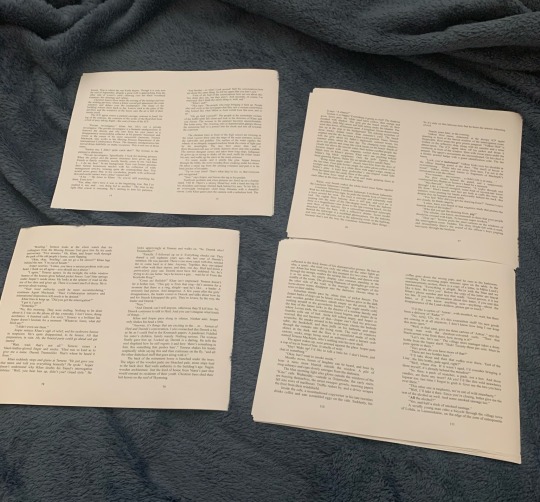
Four of the signatures above. There were nine total, eight of them with 8 sheets/32 pages and the last was five sheets I think. Threw the pdf into adobe acrobat and went straight to printing with those settings and the “booklet” option enabled.
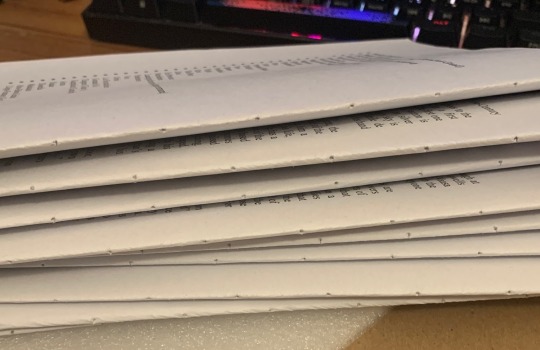
Pricked holes through each signature! Used thumbtacks and a piece of foam I scavenged from my room, worked out great. It’s probably also worth mentioning I do not have a bone folder, book press, or any of the other fancy schmancy bookbinding tools. Flattened the pages with a pencil and pressed with D&D books…
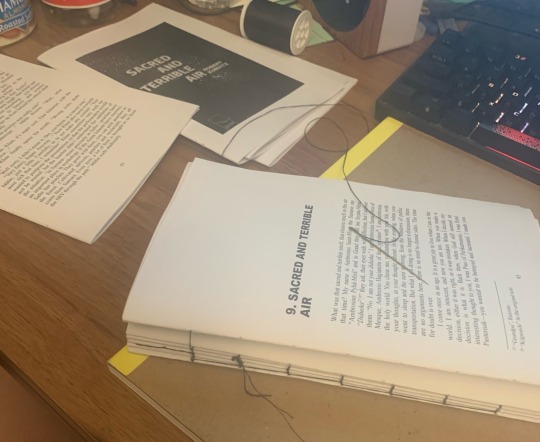
SEWING TIME. I have never sewn in my life. My success in this regard can be majorly attributed to Sea Lemon on youtube, particularly this tutorial:
youtube
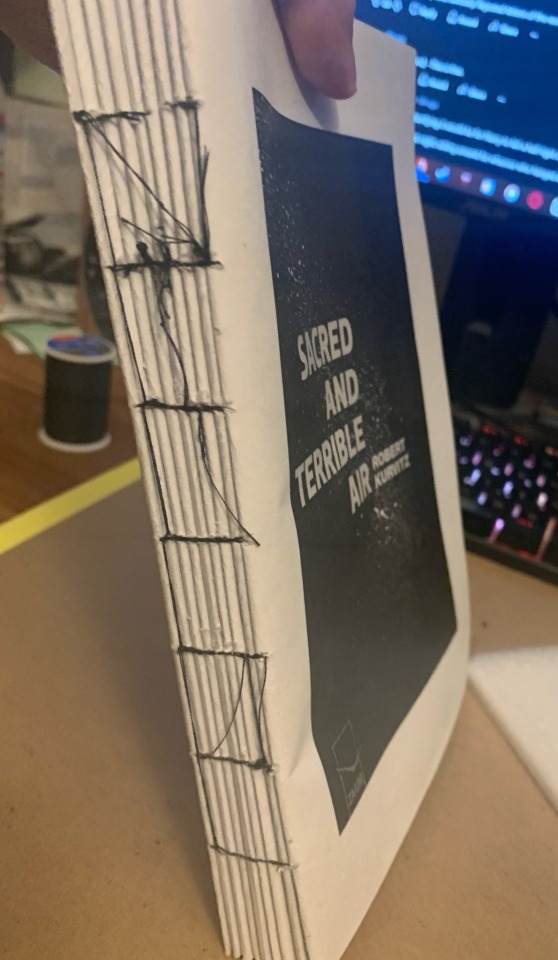
The process from printing to finishing sewing the signatures took ~8 hours. Now we hit our first roadblock, I had no glue for the spine! After going to sleep and waiting what felt like ages (literally 10 hours or so) before I was free to visit a craft store, I tried to find PVA glue because that’s what you’re supposed to use I think?? Yeah. They were out of PVA glue and my impatient ass got mod podge.
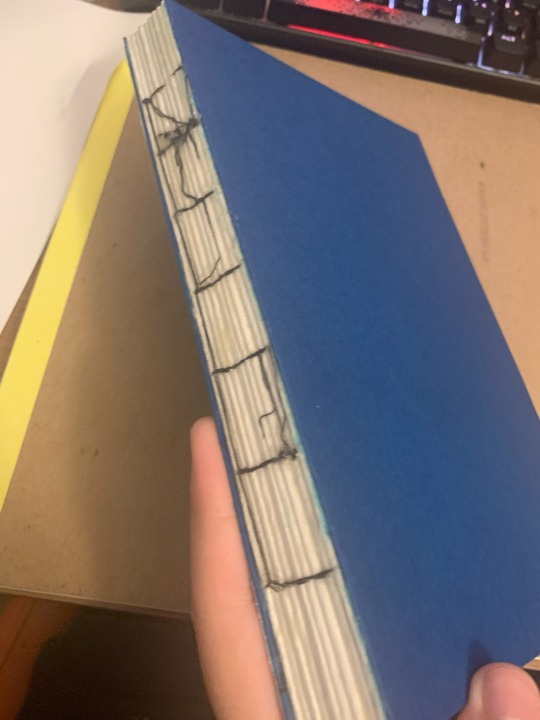
‘Tis glued! As you can see I added cardstock to the ends. Joyous day.
Also, you see that sketchbook in the pic? Yeah? You see that lovely cardboard?
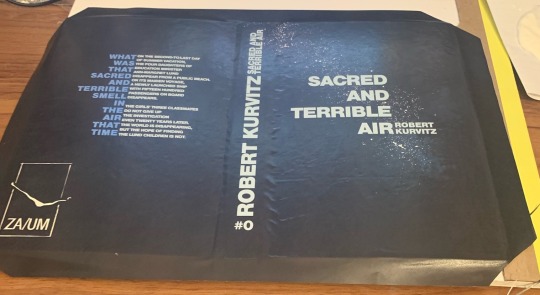
It is now the cover. Rest in piss bristol sketchpad backing.
———
EDIT: I see a bunch of people want to attempt this so here’s a video on how to make the hardcover: https://youtu.be/Av_rU-yOPd4?si=7T5zgVJGAfPFBxn-
youtube
I didn’t use any measurements or advice from it but it’s a good reference for when it comes to assembling the cover from ~3:50 onwards. The boards are same size as your text block pages and spine, I think I made the cover width a bit longer just in case it doesn’t cover the text block though. Do not do this with the spine, I regret it.
And note, this is NOT a tutorial, it is the process of someone who got a bit too silly and decided to bind a book, obviously do your own research lol. Don’t be afraid to try it though, it’s surprisingly simple!
———
… So, now that’s done! I swore to myself I wouldn’t start reading SATA/PJÕL until I finished this project completely, meaning I’ll be doing that now yippee :]
#sacred and terrible air#püha ja õudne lõhn#disco elysium#pjõl#i’m normal#proud of this despite it being pretty scuffed#uhh yeah#the spine is a bit too wide but who cares at this point HAHA#my art#i guess?? my creation??
243 notes
·
View notes
Text
Don't Ask Me for QL Recommendations Because My Taste is BAD
Bad as in TRASHY.
For your own good, don't ask me for recommendations.
I'm writing this because I've gotten some asks lately for QL recommendations and I wanted to spare you the pain.
If you still don't trust me (because to be fair, why would you? I'm just a random weirdo on the internet), let me tell you how bad my taste is so you'll know why I'm doing you a great favor by sparing you the pain.
(I also watch, and rewatch, series/films for ridiculous reasons, yet another reason not to listen to me. I’ll come back to this in a minute.)
Let's start with a brief rewind to a couple of decades ago (because it matters in this context).
The first queer content of any kind I can remember watching was Xena: The Warrior Princess in the late 90s and early 00s (I was a child/pre-teen at the time). It was such a pivotal point for me, which is why I remember it vividly. Not only was Lucy Lawless (the actress playing Xena) the most beautiful human being I had ever seen at that point, Xena was also queer and I loved her.
The series, though? It’s bad.
It’s over-the-top, contains ridiculous humor, face-palm-worthy fight scenes, etc., etc. (But, it was also the 90s, so it was quality television at the time, no matter what anyone else says.) It was so bad that it was ridiculously entertaining. I would watch it today (if I could find it anywhere…). That’s how bad my taste is (or how attached I am to bad shit).
That’s when the groundwork for my bad taste was laid. I blame THANK Xena: The Warrior Princess for it.
Then there was a huge skip until July last year when I found the Asian QL world, because I had no idea it even existed (I’m from Europe, btw).
(My personal story is that I fell into the queer/gay film world before the QL world, and the queer films I could find were made and released very sporadically. But ever since I found the treasure trove of Asian QL series in July 2023, I’ve watched 291 series/films as of right now.)
The reason I fell into the Asian QL world was thanks to a Short on YouTube with the main characters from Roommates of Poongduck 304 kissing. (Want to know what convinced me to watch it? One of them was wearing blue and the other pink, two of my favorite colors. Yep, that’s the reason. Told you it would be ridiculous.)
Since then, I’ve been exploring this rabbit hole and loving every second of all the bad shit that’s out there (there’s some great shit too, and some great things that aren’t shit at all, but they’re not really my taste because my taste is trashy, remember?).
I quickly noticed what my taste was pulling me towards and, in some cases, the trashier it was, the more I liked it.
(I’m talking about fiction here. I’m mature enough to be able to separate fiction from reality. Just because I enjoy watching a series/film that depicts a problematic topic, and sometimes do it in a problematic way, doesn’t mean I condone it in real life. I’m just putting this here as a disclaimer because people on the internet are easily offended nowadays. And I honestly don’t have time to respond to people who are venting their anger after purposefully misinterpreting what I’ve said, unless there’s a very valid reason, which there usually isn’t.)
So, what are some of my favorites that I absolutely do not recommend you watch?
Unless you want to watch trash, then, have at it. Just don't say I didn't warn you.
(Btw, if you like any of these, I apologize for calling your taste bad and trashy. But, if you like any of these, I think you already know your taste is bad. Also, if you like any of these, hey, bestie!)
Let’s start with the less extreme ones so I don’t scare you away from the start. After that, they’re in no particular order.
(With the issues/TW section for each series/film I include possible trigger warnings, taboo topics, what viewers/commenters have brought up as problematic, my possible issues with the writing, etc. I won’t list everything (because some of them would have looong lists) but I’m including some of the major ones.)
Kiseki: Dear to Me (Taiwan)
Issues/TW: Dubious consent, age gap, “adoptive” brothers becoming lovers, etc.
Both couples in this series have their own set of issues. Ai Di and Chen Yi are the “adoptive” brothers who become lovers while Ze Rui and Zong Yi have an age gap (I can’t remember how big of an age gap but I think it was close to 10-ish years).
(Before I move on there’s one thing you should know about me… I was born into a family with a varying degree of age gaps within marriages, from 2 to 23 years. Even though we’ve talked about the bigger age gaps occasionally, it’s never been an issue. I don’t mind age gaps as long as they’re legal. Does that mean I would hook up with someone in their late teens or early twenties? No. I would rather hook up with someone who has a fully developed brain, which science suggests doesn’t happen until somewhere in the mid-to-late-twenties. But it does mean that age gaps (as long as they’re legal) aren’t something I’ll be bothered by or judgemental of.)
Kiseki: Dear to Me is one of my favorite series because:
It’s from Taiwan, and the Taiwanese QLs are generally great at dealing with more difficult and taboo topics.
Ai Di is the feistiest, most colorful, and pettiest bitch and I love him with my entire ice-cold heart.
Chen Yi looks amazing in black.
The neon lights (because I’m a slut for that).
Also, the kissing (from both couples) is great.
You know, I did say that these would be series/films I absolutely do not recommend you watch. But I’ll actually recommend this one. Watch it. It’s great.

Unknown (Taiwan)
Issues/TW: Age gap, “adoptive” brothers becoming lovers, etc.
This is another one I’ll actually recommend you watch because it’s great.
The main couple (Qian and Yuan) are the “adoptive” brothers becoming lovers while the age gap is most prominent between San Pang (Qian’s business partner) and Lili (Qian’s younger sister). There’s also the fact that San Pang is part of their chosen family and has seen Lili grow up and stuff. So, if that bothers you, then don’t watch it.
The biggest reasons I would personally recommend it to those I know aren’t particularly bothered by taboo topics are because:
The yearning is palpable (and I love shit like that).
Qian would move heaven and earth for his family.
The great story.
The even more amazing acting.
Some moments made me bawl (and since I'm an ice queen, I get obsessed with shit that shatters my ice and makes me cry).
I know I said my taste is trashy… but I would actually give myself a gold star for loving this one.
Now, back to the real trash…

Love in the Air (Thailand)
Issues/TW: Dubious consent, SA, rape, MAME, etc.
Everyone and their aunt (or however the saying goes in English) seem to have an issue with MAME (the original creator of LITA and several other trashy BLs) and for good reason. (I would say that she improved a lot with Wedding Plan, which is the least problematic thing I’ve watched from her and it’s the latest series of hers, as of right now.) If she’s grown, remains to be seen. But it doesn’t change the fact that LITA has some issues.
Honestly, I just watch this for the visuals, as in the motorcycles and the neon lights. That’s it. That’s the reason.
I mean, if you look at the whole first sex scene between Sky and Prapai, you get what I mean with the neon lights. It’s divine. (I recently rewatched LITA for this very reason. A waste of time, you say? Not when you’re a slut for neon lights.)
Don’t watch this though! Just enjoy this gif instead…
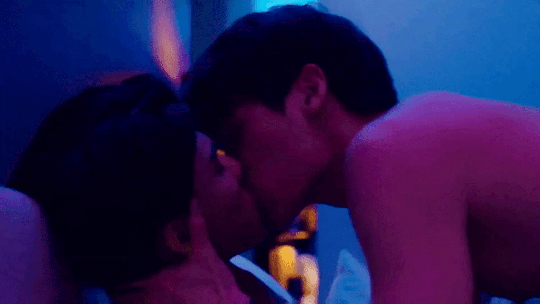
I just saved you 13-ish hours of your life. You’re welcome.
TharnType and TharnType 2: 7 Years of Love (Thailand)
Issues/TW: Dubious consent, homophobia, domestic violence, MAME, etc.
Don’t watch this. This is bad. As in, really bad. And all the issues are in the main couple’s relationship.
But, since my taste is really bad, I rewatched this recently for horny reasons (it’s Mew, after all, and he’s got me in a chokehold for some reason). It’s still as bad as I remembered it, but I would still rewatch it for Mew’s sake (and because Techno is ridiculous throughout both seasons, which means I love him).
To be fair there are other, a lot spicier, series that I watch more often for horny reasons (yes, some of them are in this post because they’re trashy too), but none of them include Mew. And since I have to get my dose of Mew from time to time, I return to TharnType (especially the second season).
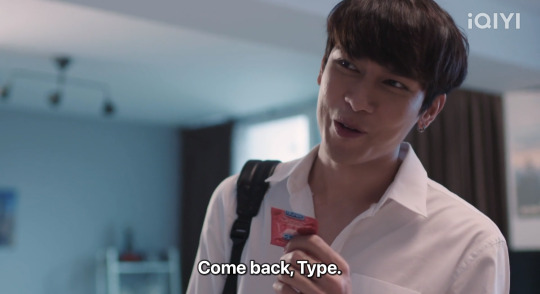
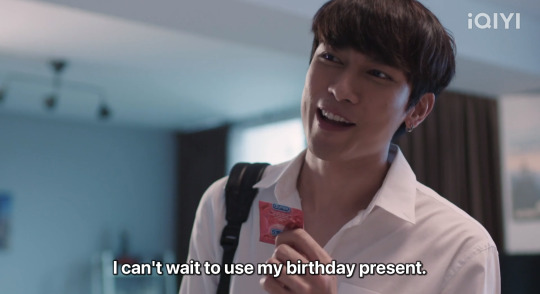
Big Dragon (Thailand)
Issues/TW: Dubious consent, blackmail, etc.
This isn’t that problematic in my opinion, but there is definitely a drug-induced sexcapade that’s taped and used for blackmail for a while. And that's how the series starts.
I recently did a rewatch of this and it was still bad (in a good way) and I loved every second of it.
What I love about this series are:
The visuals. The set designs are beautiful (especially Yai’s home and the bar, before he demolishes it). As a visual artist, this is speaking to my soul.
The chemistry between Yai and Mangkorn.
Pong and Park. Two idiots I love with my whole ice-cold heart.
And the title track because it’s addictive as hell to listen to.
Also, the sex (which my horny ass needs). Let's not forget the sex. Those scenes were also visually stunning, which made me love them even more.
Honestly, I'll kneel and bow down to this shit because it's that great.
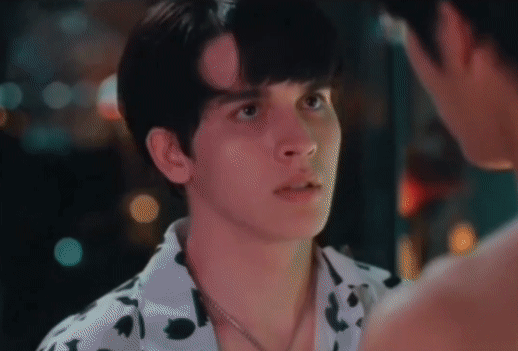
Don’t trust my judgment, though, because my taste is trashy.
Only Friends (Thailand)
Issues/TW: Manipulation, stalking, promiscuity, etc.
This series is messy in terms of intrigue (especially from Boston and then Boeing’s part). The ending had some issues. The sex isn’t everyone’s cup of tea, either. I, on the other hand, would drink a whole pot of this.
Overall, I loved this trash. Mainly because of:
How visually stunning it is.
Sand. He’s a hardworking, good person. He’s also a proud bi!
How they depicted and handled Ray’s addiction and recovery. (I know some watchers were upset that the focus of the series landed on Sand and Ray towards the end while neglecting the other characters, which is a valid point. However, setting that aside, the way they portrayed Ray’s addiction and then his road to recovery in the last couple of episodes was realistic, and I loved it.)
The promiscuity, because I loved it and the mess it created.
Boston being a slutty asshole. The more of a slutty asshole he was, the more I loved him. (I know, it’s a me-problem.)
Boeing coming in and kissing (almost) everyone.
It’s trashy, it’s messy, and I love it!
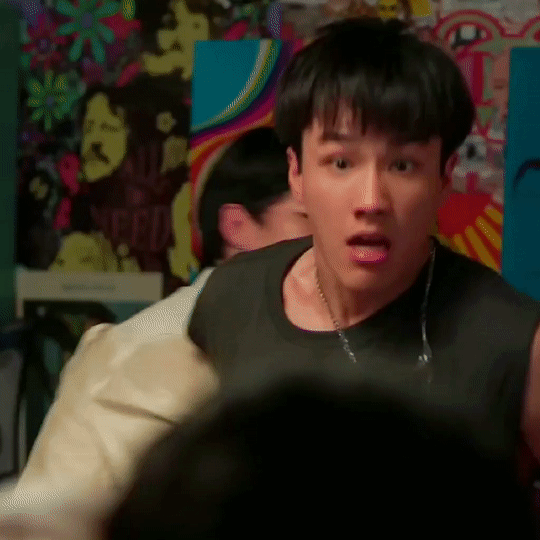
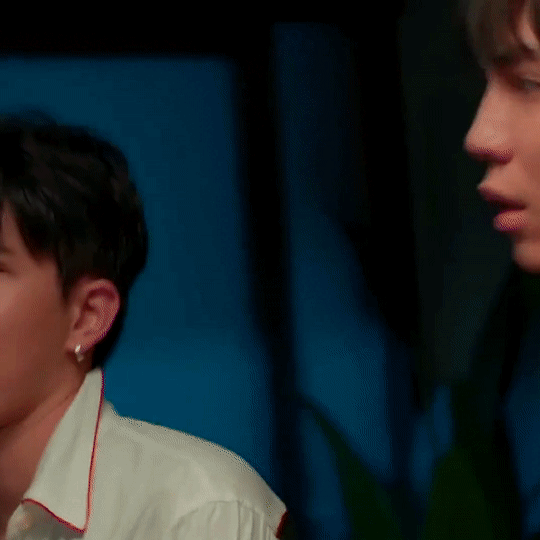
But, I don’t recommend it to anyone.
My Beautiful Man 1, 2, and 3 Eternal (Japan)
Issues/TW: Dubious consent, obsession, bullying, lack of (or no real) communication, etc.
I love this series (2 seasons + 1 film), but I honestly don’t see it as particularly problematic. But I know others will disagree with me, so here it is on my list of trashy QLs.
I don’t mind Hira’s obsession because I know Kiyoi is just as whipped for Hira (even though he doesn’t know how to communicate it to Hira at first, especially in a way that Hira understands). Would I be okay with someone’s obsession and stalking in real life? Of course not. But, as I mentioned before, I’m mature enough to separate fiction from reality.
Also, I love miscommunicating characters, especially when the misunderstandings they create bring out all the emotions (angst, hurt, anger, sadness, embarrassment, etc.) and even the flight response. I especially love miscommunicating characters when they learn to communicate throughout the series/film. And this series is especially delicious on the miscommunicating part.
But, it’s also problematic, apparently. So, don’t watch it.
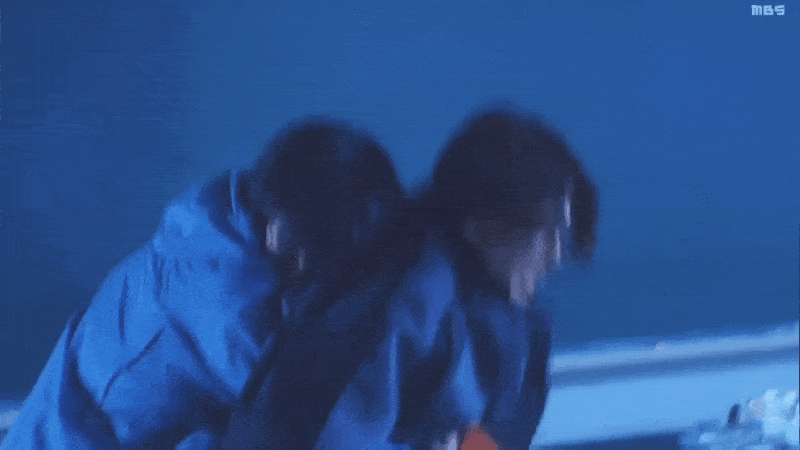
The End of the World With You (Japan)
Issues/TW: Blackmail, biphobia, cheating, etc.
I’ll be honest and say that I’ve only watched this series three times. And that’s because the biphobia is fucking annoying. In this series, the bi character is depicted as a cheater (which is common in QLs, btw). It’s an exasperating stereotype. Cheating has nothing to do with your sexuality and everything to do with who you are as a person.
(I mean, you can be a proud bi like Payu in LITA or Sand in OF. They have eyes only for one person as soon as they’re pursuing or dating someone. Give me more bi characters like this, please.)
We could discuss how cheating can be used as characterization in certain stories. But not in this one. Here, they’re basically using Ritsu’s bisexuality as the reason he’s cheating (since he’s sleeping with Masumi while having a thing going on with a girl, and then sleeping with a girl when he has a thing with Masumi), which is why it’s bothering me in this series.
If I’m going to tell you why I like this series, however, it’s for 2 reasons:
It’s about getting a second chance, a topic I love.
The sex (laser-focused horny Ritsu is my favorite Ritsu).
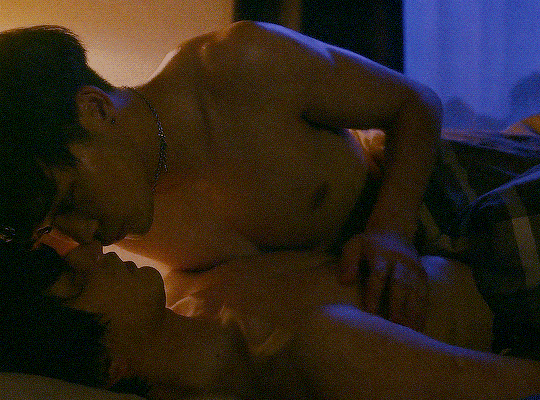
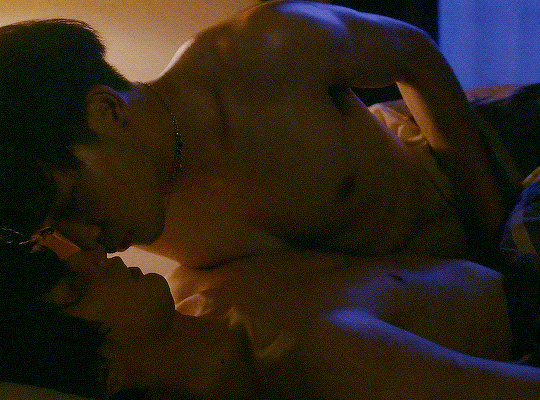
Check Out (Thailand)
Issues/TW: Biphobia, cheating, lazy writing, etc.
(It should be mentioned that I’ve read some comments about some issues involving the company behind this series. I haven’t dug deeper into this so I don’t really know if there’s any substance to the comments I’ve read (like official statements from the company or the other people involved, etc.). But I’m putting this out there in case this might be a potential issue for you (even though I’ve already told you that I don’t recommend you watch any of these because they’re all trashy).)
When I first checked this out at the beginning of this year, this series seemed to have created a storm of bad comments and reviews on MDL since it first came out. So, obviously, I needed to watch it because my taste is trashy.
And, you know what? I loved it!
Besides having the bi character depicted as a cheater (again, the use of this biphobic stereotype is so fucking annoying) and the sporadic clunky and stale scenes, I loved this series because:
It’s about second chances. As I mentioned before, I love that topic.
Best (the actor playing Daonuea) is the best in this series. There’s just something about him that grabs my attention every time. He has me in a similarly tight chokehold as Mew.
There’s sex (and my horny ass needs it).
But, it’s also trash, so don’t watch it.

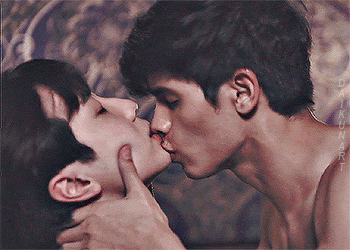
Pit Babe (Thailand)
Issues/TW: Domestic violence, non-consensual, SA, age gap, etc.
This became popular. Really popular. I saw people comment about it everywhere. And usually, when stuff becomes popular, it’s more than likely reduced to trash quality by the general public. So, obviously, I had to watch it.
Did I end up loving it? Yes.
Honestly, the biggest issue this series had for me was the whole omegaverse thing (this was a new thing for me because I don’t come from an erotic fiction background, my head was rather stuck in fantasy fiction). And, from my limited understanding of this, they didn’t seem to fully commit to the omegaverse thing in Pit Babe, which was unfortunate.
The racing was also so-so for me, which hurt my soul because I usually love racing (cars, mcs, boats, etc.).
What I did like, however, was:
The chemistry between Pete and Kenta (and I’m so sad I only got crumbs of this).
Pavel (the actor playing Babe). I would watch and listen to him recite product placement scripts for toothpaste all day long.
The sex, especially the scene with Babe and Charlie in ep. 9 (even though it was mixed with clips from the racing) and Jeff and Alan’s scene in ep. 13 (because it was sensual, if we ignore the music).
The neon lights (have I mentioned that I’m a slut for neon lights?). I mean, just look at this:
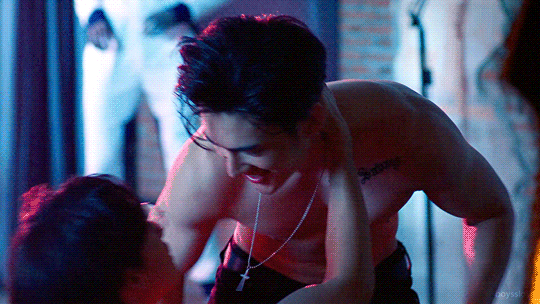
I can watch that pinkish light all day long, even though Babe and Charlie are trying to distract me. (Especially Pavel!)
Dead Friend Forever (Thailand)
Issues/TW: Grooming, bullying, suicide & suicide attempts, etc.
Besides the issues listed above, this also suffered from lazy writing at the end. BUT, I fucking loved DFF anyway.
I never expected to love this series because it’s just a bunch of teenagers stuck at a house in the woods. How interesting could that be? Turns out, very.
DFF wasn’t perfect (perfection doesn’t exist anyway), but what I loved about it was:
The morally ambiguous characters.
The revenge plot.
The poetic justice.
The questioning of what was real vs hallucination.
The visually stunning shots.
The mask!
And Tan’s mask!
The beheading scene.
I could go on, but you get the point. I just love this piece of trash.
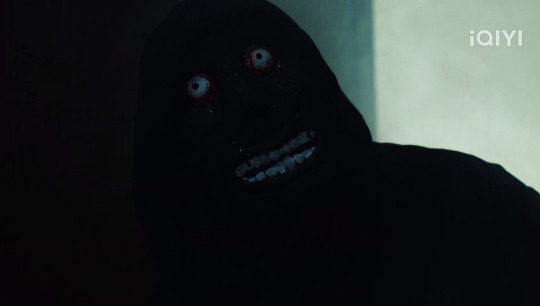
But, please, don’t watch it. You will suffer from brain rot. Trust me.
I, however, am currently rewatching this because I choose the brain rot. And my taste is trashy, remember? Or, perhaps I just love watching chaos unfold…

HIStory 3: Make Our Days Count (Taiwan)
Issues/TW: Dubious consent, age gap, tragic ending, etc.
Everyone and their aunt and even their dog have an issue with the ending of this one. And it’s understandable.
I don’t necessarily like or dislike the ending. Obviously, the bury your gays trope is tragic in itself, and, tragically, it’s still being used. That’s why I couldn’t find myself liking the ending, even though I don’t mind tragic endings. (Romeo and Juliet is one of my favorite classics, which people tend to forget is a tragedy and not a romance, btw, but I digress…)
At the same time, though, this series made me cry for a whole episode before tragedy struck because I could feel it. And you have no idea how obsessed I get about shit that makes me cry (since I’m an ice queen).
(Another side note: one of my favorite BLs is Once Again, which made me bawl throughout the whole series. It’s not on this list because it’s neither trashy nor bad, but it’s still one of my favorites because it broke me in the best ways. But, anyway…)
The best part of this series from beginning to end was the other couple, at least for me. This couple is the one with the age gap (which, again, doesn’t bother me) and I fucking love them! One, because Wilson Liu (the actor playing Bo Xiang) is such a gem. Second, because their first time was such a spur-of-the-moment thing fueled by a desire that went from 0-100kph in less time than a Ferrari would. And I loved it (just as much as the squeezing of boobs from behind, which, for some reason, appeals to me).
Also, the twins are so pretty it’s annoying.
Do I recommend it, though? No, because I don’t have time to respond to the clap back I’ll get when you come to the end.

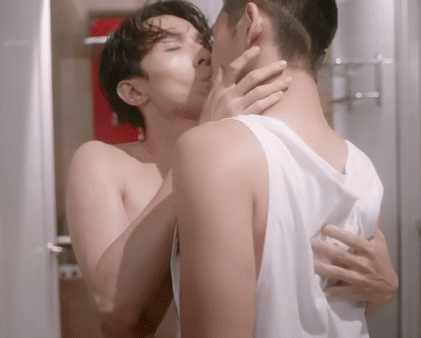
HIStory 4: Close to You (Taiwan)
Issues/TW: Dubious consent, SA, obsession, age gap, stepbrothers becoming lovers, etc.
This one has some problems (especially the relationship between Yong Jie and Xing Si), but I love both the series and its problems (yes, I’m trash). You could say that I’m as obsessed with this series as Yong Jie is with Xing Si. Would I get this series drunk and fuck the living daylights out of it? No. But I would watch it once every 3 months or so. Oh, wait… I already do that. Because I’m trash.
What do I love so much about this series (other than what I mentioned above):
It’s from Taiwan.
Li Cheng is ridiculous, which is exactly why I love him.
Every time I rewatch it, it gets funnier.
The chemistry between Li Cheng and Teng Teng is amazing.
As well as the chemistry between Yong Jie and Xing Si.
The kissing is just as amazing.
The main fujoshi girl, Mei Fang, is so cute I can’t handle her.
And the bathroom scene! In that lighting! It’s iconic!
I don’t care what anyone else says. This is fucking gold to me. But, then again, my taste is trash. So, don’t listen to me.
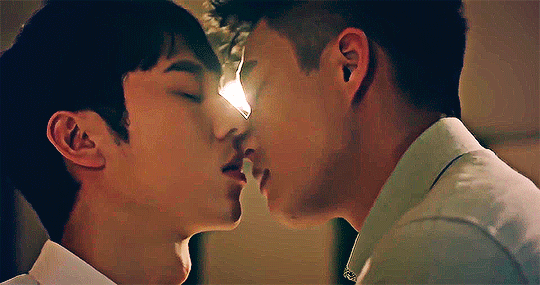
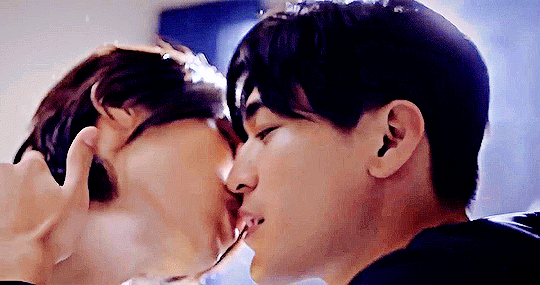
KinnPorsche (Thailand)
Issues/TW: Dubious consent, SA, torture, Stockholm syndrome-ish, etc.
This is some next-level trash, and I fucking love it.
Two of the major relationships in this series (Kinn & Porsche and Vegas & Pete) are problematic at some point. Especially Vegas and Pete who have this whole captor/captive, torture, BDSM-ish type relationship. Of course, I love Vegas and Pete because my taste is super trashy (yes, it’s a me-problem, but I don’t force my taste on other people, so, for the love of all that is holy, don’t watch this!).
Other reasons I love this series and rewatch it from time to time:
It’s visually stunning! The cinematography is amazing. As I mentioned before, I’m a visual artist, so this is a very valid reason for me to watch it again and again. And again.
The neon lights.
The whole mafia thing.
The sex (because my horny ass needs it).
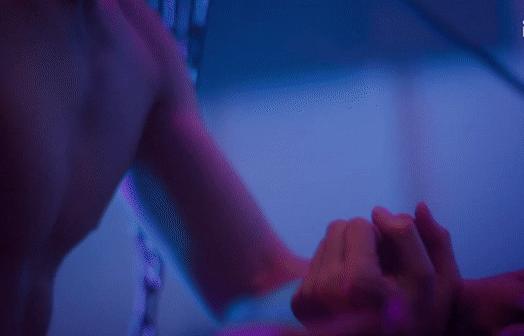

Playboyy (Thailand)
Issues/TW: SA, homophobia, suicide, etc.
I was debating whether or not to add this to my list solely based on the ending. However, up until that point, I really liked it.
The fact that every episode starts with a whole ass list of trigger warnings tells me this is my shit. And it was.
At times, it was so bad that it was good (until the ending, which was just so bad it was bad). The things I liked were:
The mystery.
Win (who played Nuth). His acting was great.
The chemistry between Nuth and Phop.
The tattooed daddy that’s Aob and his chemistry with Puen (there’s also an age gap here, btw, but as I’ve mentioned before, it’s fine by me as long as it’s legal).
The weird ass sex scenes (and the underwear).
And the not so weird ass sex scenes (like the ones between Aob and Puen and the ones between Nuth and Phop).
But, this series is trashy. Keep as far away from it as possible. If you still decide to dip in, don’t say I didn’t warn you.

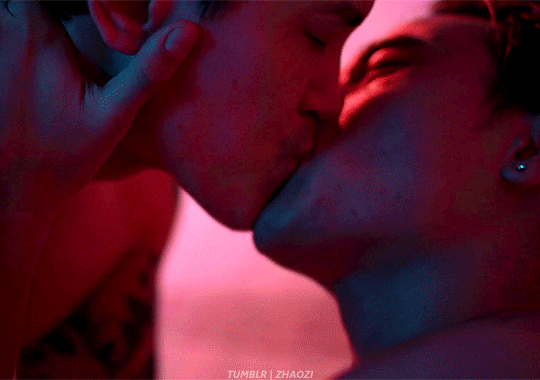
Red Wine in the Dark Night (Thailand)
Issues/TW: Obsession, blood, human blood bags, etc.
This is a queer film that’s BL-ish with some dark themes. Mainly, it’s about how far Wine would go to help the person he’s fallen for (or become attached to).
What I loved about this film was:
Fluke (who plays Wine). He’s such a great actor and I love him in everything he does.
Wine who is so desperate to love someone and be loved that he ends up doing some weird shit.
The darker and sadder vibe, which I love.
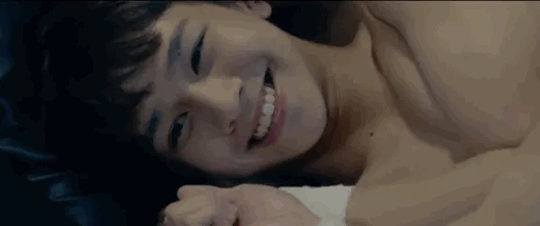
Irresistible Love 1 and Irresistible Love 2 (China)
(This is also called Uncontrolled Love.)
Issues/TW: Obsession, homophobia, codependency, adoptive brothers becoming lovers, etc.
This is another queer film (in two parts) that is more BL-ish than the films I’m getting into below.
This depicts a weird relationship dynamic between Xie Yan and Shu Nian where Shu Nian was basically adopted into the family to become Xie Yan’s friend/babysitter/lackey. This is some weird ass shit, and I love weird ass shit so I really enjoyed this rare, uncensored, gem from China.
But, it’s also trashy. So, don’t watch it.
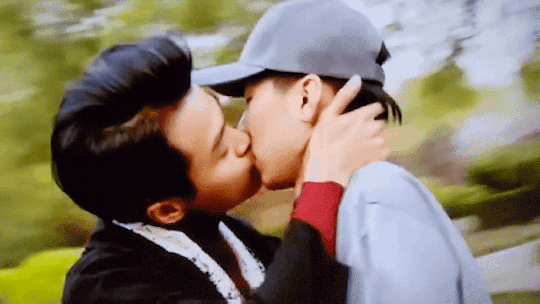
The next couple of films I’ll mention are (obviously) trashy, but also complex and deep (which is why I love them).
One Summer Night (South Korea)
Issues/TW: Obsession, dependency, oppression, etc.
This is a low-budget film from 2016 (so, production-wise, it’s definitely nothing like the usual stuff from South Korea you can watch on Netflix), but I love it.
It’s gritty, it’s raw, it’s explicit (an emphasis on explicit because you’ll see dicks), it deals with being a North Korean defector but ending up in an impoverished situation in South Korea, and it ends with a dubious ending you can interpret in different ways.
This is definitely not for the general QL viewers who watch QLs for the cutesy stuff.
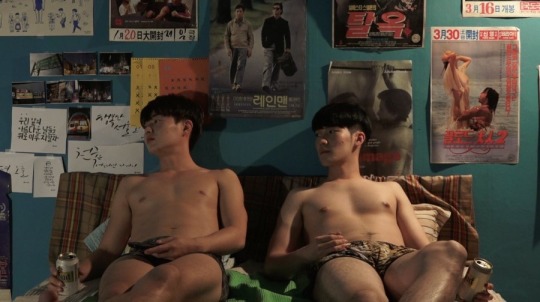
And it's trashy. So, don’t watch it.
Dangerous Drugs of Sex (Japan)
Issues/TW: All the trigger warnings! Seriously. I feel like it’s better to say that so you’ll look up the TWs for yourself (if you choose to watch this, which I'm asking you not to) rather than me mentioning a few and forgetting others.
With this film, what others see are all the trigger warnings (and, yes, I see them too, they’re fucking obvious). However, I can see beyond that and watch it for what it is at the core: Two characters dealing with incredible grief.
Grief is a topic that often affects me and I can relate to it because I’ve had to deal with a lot of grief in my relatively short life. Watching a film like this where grief pushes the characters to their very limits will (often) get a special place in my heart, especially if done well. And it’s done very well in this film.
Do I condone the characters’ behaviors? No (especially not Yoden Ryoji’s). But I do understand that grief can send you over the edge (and in some cases throw you off the edge) because I’ve experienced it. I do understand that grief can cause you to make horrible decisions because I’ve done it (though, not this extreme). I do understand that grief can be self-destructive because I’ve been there. This film shows it all. That’s why I love it so much.
Do I recommend you watch this, tough? No. Don’t do it. This is not for everyone. It’s definitely not for those who watch QLs for the cutesy stuff.
But it is for me because I love trash. Especially good trash. And this is the best trash I’ve ever seen when it comes to gay films.

Anything by Scud Cheng
Lastly, I want to mention any film by Scud Cheng because…

And I’m an artist so art means everything to me.
Cheng is a screenwriter and director from Hong Kong. His films, the ones I’ve seen, are gritty, nude, and real. They are more on the art side than the others I’ve listed above, which is why they have a special place in my heart.
They’re also deep and explore themes like introspection (are we doing things because we believe they’re the right thing to do, or because external forces have “brainwashed” us to believe they’re the normal thing to do?), the porn industry and how it exploits young and queer men, death, politics, and love, to name a few.
These are not for the average QL watcher. They’re not for the faint of heart. They’re not for those who want an entertaining watch.
These films require multiple viewings. I’ve watched some once, some twice, and some more times, and I still find new themes and meanings woven into the stories. So, they’re complex and deep.
But, don’t watch them because I know you’ll come at me later. So, to spare us both the time and energy it would take to argue about this shit, just don’t watch any of it.
Now, if you still want to ask me for recommendations after all that, don't tell me I didn't warn you!
#kiseki: dear to me#unknown#unknown the series#love in the air the series#tharntype#big dragon the series#only friends the series#the end of the world with you#my beautiful man#utsukushii kare#check out the series#pit babe the series#dead friend forever#dead friend forever the series#dff#kinnporsche#kinnporsche the series#history 3: make our days count#history 3: modc#history 4: close to you#playboyy the series#red wine in the dark night#irresistible love#uncontrolled love#one summer night#dangerous drugs of sex#taiwanese ql#taiwanese bl#taiwanese series#thai ql
115 notes
·
View notes
Text
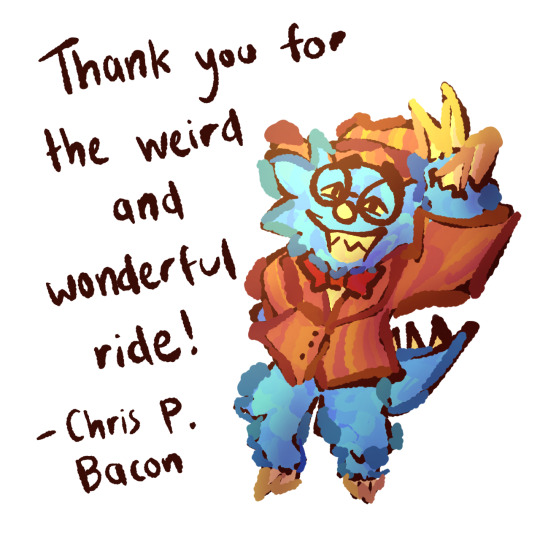
Ending April with a small parting gift. I’m gonna miss this.
Anyways, an announcement of my own.
The short of it
I’m leaving the Watcher fandom. Don’t worry, I won’t be unfollowing anyone, but I will be ceasing the creation of art for Watcher and interaction with the community at large. Thank you all for this short but meaningful ride. Feel free to unfollow me if you were here for Watcher art, and for those who stick around…
Thank you :]
I hope to not disappoint with this new era of mine.
The long of it
It’s been a couple of days since a certain channel dropped an announcement that imploded its fandom. It was… a mess. A lot—and I mean a lot—of us didn’t handle the news well, and we made that known to everyone. The impact was so massive that YouTubers, who are nowhere near the niche that Watcher operates under, covered the situation, and some of them explained very well why the decision went over so poorly. Meanwhile some of them made fun of the situation, and some were just there for the clicks, but that’s the cycle of YouTube drama for you.
With the amount of ears waiting for even a peep out of their mouths, Watcher couldn’t ignore the backlash any longer and released an apology video three days after the announcement. By all accounts, it was a pretty good response. The reception was mixed, but it was definitely more well-received than their first video, and they actually listened to their fans who gave them valid criticism over the sudden shift to a streaming service.
However…
For as much as I appreciate their response, I still can’t find it in myself to continue following Watcher. I really mean it when I say this disaster soured any enjoyment I had for them. I don’t think I’ll ever be able to watch them again for a long time without thinking about this situation or remembering the people they have hurt, even if unintentionally, through their poor execution of a business decision.
Do I believe they could’ve pulled off moving their content to a streaming service? Absolutely. However, so many factors doomed this decision and their announcement from the start from them believing that $5.99/month was “affordable to everyone” (seriously?) to them insisting that this was for the fans even though the fans have vocalized that they were never there for the high production value. They were there because the three guys who run Watcher were enjoyable!
I feel like if they had been honest about the fact that the TV quality they are aiming for was more for themselves than anyone–hell, it’s the mission statement in their About page, and, I don’t know, considered the idea that $6 is not cheap, especially for international fans, people wouldn’t have gotten so angry at them. Now, there are still numerous issues plaguing this business model, but to go through all of the arguments would require a separate post, and I’ve already expended too much energy on this situation. Needless to say, Watcher has burnt their bridges, and it will take a while before they can build them back up again, let alone get people to trust them enough to cross them.
On the other hand, I can’t blame Watcher fully for my departure. Despite my heavy disagreement with their initial decision, I understand why they thought this decision was a good idea in the first place as YouTube is a very unstable career path, and it would rather hurt its creators with its relentless demonetization, censorship and restrictive guidelines than give up just a tiny amount of its profit. Besides, they’re in control of their content, and they could do what they want with it even if their fans disagreed with them.
Speaking of the fans, my god. The situation revealed a side of the fandom that I never thought I would see, but in hindsight, I should have seen it coming. To see fans resort to anti-Asian racism and death threats so quickly was extremely heartbreaking, and as an Asian person, it made me feel very unsafe and unwelcome in the community.
Moreover, using Steven as a scapegoat to absolve Ryan and Shane of any wrongdoing was unfortunately a very common response. Yes, he is the CEO, and yes, his series being centered on traveling and eating expensive food really doesn’t paint him in a positive light, but need I remind you that RYAN AND SHANE ARE GROWN ADULTS. They’re the founders of Watcher, and they both have to agree to the initial plan for it to be implemented. You can’t assume that Steven was a boogeyman terrorizing your precious little boys just based on a 15-minute video. You don’t know what’s going on behind the scenes.
All of this to say that the initial announcement combined with how the community reacted violently to the announcement really nipped my interest in Watcher in the bud. It was a shame too because I really did love Watcher, and I still do. Had it not been for the time I invested in following them, I wouldn’t have made great friends, regained the joy in creating art–even reviving a hobby/skill that I assumed was long dead, and had a reason to be able to laugh or smile even in terrible days. I truly am grateful for Watcher, and I do not regret ever getting into them at all. However, I think it’s time for me to go.
Thank you all for this weird and wonderful ride, but at some point, you’ll have to hop off. I just didn’t expect to hop off it so soon.
#Back to hiatus I go (for real this time) I’ll see y’all in 3 weeks 🫡#I’m more sad than anything#But alas we move forward#Thank you everyone#It was fun while it lasted#the professor#puppet history#watcher#watcher entertainment#we are watcher#art#chris p fried art#chris p fried rambles
69 notes
·
View notes
Note
Hey, I’m really sorry to dump this onto you. I really apologize. I don’t know who to talk about this anymore.
I’m 26. Struggling with the void state. I basically messed up my entire life and career and I only found out of the void state like 8 months ago. But I find myself getting so frustrated.
I know it’s easy and it’s basically us. But I can’t seem to grasp this and achieve it. Do you have any tips about this please?
hiya, you really don’t need to apologize! I totally get you and it can take some pressure off when you talk out your worries;
I understand where your frustration comes from, it took me 4 years to finally get any results in my journey, I was just so desperate to get out of here I kept persevering even when I felt like giving up
I don’t know if you want to use the void state to shift or manifest something here but let me tell you something!!
even if it takes you 10 years to get your desires, after you get them, those years will feel so insignificant and short lived compared to the life you live after
why does it matter you messed up your life and career when you can fix everything overnight? the 3D be damned, it’s so irrelevant I literally just laugh when I think how powerless it is compared to me or you
I suggest you take a step back and relax. find the source of your frustrations and address it. treat everything with indifference and keep persisting. even with not entering the void yet, you can manifest a better life here and now. when something negative comes my way i manifest it away immediately, I don’t stay sad or stressed for more than 10 minutes. even if I fail entering the void or shifting, I remind myself I have all the time in the world to achieve it
entertaining the void is very easy: you just need an alternate state of consciousness (hypnogogia, lucid dreaming, sats etc) and intention. you don’t even need to have a positive mindset or fully believe it. if you’ve read my post on how to I entered the void, I mentioned how I didn’t think I can enter the void without doing yoga nidra then entered it a few minutes later because I simply wanted to get into the void
your thoughts create your reality. just state what you want, keep persisting and watch how your desires come to you
repetition and persistence are the keys; you don't have to fully believe the things you want to manifest, you just have to persist with the new thought
if you desire something, just immerse yourself in the idea that it's already yours in your imagination. affirm it, feel it, and don't let the current reality bother you. focus on your imagined reality (4D), persist in it, and over time, your outer reality (3D) will align with what you've imagined. that's when your desires come to life
here is some advice I can give regarding the void and manifesting, but I’ll also link some posts I hope you’ll find useful:
—the void state is nothing special, it’s just a deep meditative state just like when you zoom out in class and can’t hear, see or feel anything
—meditate; find a meditation you find comfortable doing and do it any time you can (I suggest doing it at least one time per day, especially in the morning). I like doing wim hof breathing method and listening to white, pink and brown noise. you can also use guided meditations on youtube. meditation can help you also release stress
—affirm daily for your desires. even if you get negative thoughts, ignore them and continue affirming
—be delusion regarding your desires. even if it feels icky at the beginning, keep on persisting
—if you can lucid dream use it to get into the void. it’s so easy and quick
links:
—cici’s meditation guide for beginners
—the void state is easy
—jani’s law of assumption guide
—the best and fastest way to manifest
—enter the void on command by turning off your left brain side
—lucid dreaming guide
—void method: wake back to bed
—void method: pink hof breathing method
—void method: distraction method
—void method: lullaby method
—meditations to enter the void state
I wish you the best!! I hope only positive things come your way from now on 🤍
54 notes
·
View notes
Text
Let’s have a quick chat….
For those of you that are familiar with 3C Films on YouTube, he made a statement tonight (playing at 1:35:32) saying that he had a synopsis for Sonic 3 and planned to release it sometime in the future. This is the same individual from a few months ago that leaked that Keanu Reeves will, potentially, be the voice actor for Shadow.
I’m sharing this with you with a couple of things to keep in mind:
What 3C Films was probably given was a general synopsis. He might have a rough idea about what the story is about, but not have all of the key details that we’re looking for. Not everything is concrete. Clarity will be given in the future.
It is okay to 100% skip what he says and wait for the release of a trailer. Absolutely! And it is 100% okay to be doubtful of this claim. Even 3C Films, himself, is hesitant of the claim. He still plans to share it anyways. If wrong, he addressed in the video that he will make an apology.
I will share what he says here for those curious, but I will make it a point in saying that it must be treated as a RUMOR. (And know that I’ll have my doubts too). All that I ask of you is to be compassionate. If the synopsis is wrong, then it’s wrong. It’s not the end of the world. If it’s right, then it’s right and we knew early. We’re all in this together. We’re in the home stretch now.
And for anyone interested in using a hashtag to blacklick, I will be using this tag: #sonicmovie3potentialspoilers
#sonic movie#sonic movie 3#sonic cinematic universe#I am very tired writing this. I’m so sorry for shitty grammar and spelling and incoherent sentences
40 notes
·
View notes
Text
The Haunting of Bly Manor as Allegory: Self-Sacrifice, Grief, and Queer Representation
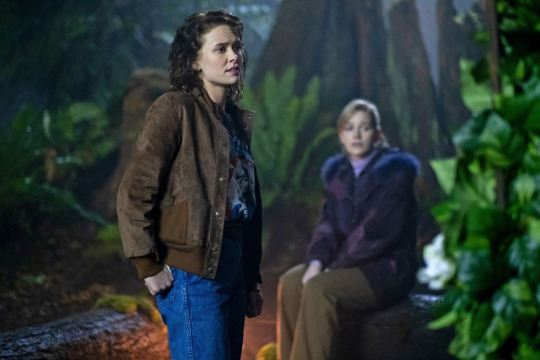
As always, I am extremely late with my fandom infatuations—this time, I’m about three years late getting smitten with Dani and Jamie from The Haunting of Bly Manor.
Because of my lateness, I’ll confess from the start that I’m largely unfamiliar with the fandom’s output: whether fanfiction, interpretations, analyses, discourse, what have you. I’ve dabbled around a bit, but haven’t seen anything near the extent of the discussions that may or may not have happened in the wake of the show’s release, so I apologize if I’m re-treading already well-trod ground or otherwise making observations that’ve already been made. Even so, I’m completely stuck on Dani/Jamie right now and have some thoughts that I want to compose and work through.
This analysis concerns the show’s concluding episode in particular, so please be aware that it contains heavy, detailed spoilers for the ending, as well as the show in its entirety. Additionally, as a major trigger warning: this essay contains explicit references to suicide and suicidal ideation, so please tread cautiously. (These are triggers for me, and I did, in fact, manage to trigger myself while writing this—but this was also very therapeutic to write, so those triggering moments wound up also being some healing opportunities for me. But definitely take care of yourself while reading this, okay?).
After finishing Bly and necessarily being destroyed by the ending, staying up until 2:00 a.m. crying, re-watching scenes on Youtube, so on and so forth, I came away from the show (as others have before me) feeling like its ending functioned fairly well as an allegory for loving and being in a romantic partnership with someone who suffers from severe mental illness, grief, and trauma.
Without going too deeply into my own personal backstory, I want to provide some opening context, which I think will help to show why this interpretation matters to me and how I’m making sense of it.
Like many of Bly’s characters, I’ve experienced catastrophic grief and loss in my own life. A few years ago, my brother died in some horrific circumstances (which you can probably guess at if you read between the lines here), leaving me traumatized and with severe problems with my mental health. When it happened, I was engaged to a man (it was back when I thought I was straight (lol), so I’ve also found Dani’s comphet backstory to be incredibly relatable…but more on this later) who quickly tired of my grieving. Just a few months after my brother’s death, my then-fiancé started saying things like “I wish you’d just go back to normal, the way you were” and “I’ve gotten back on-track and am just waiting for you to get back on-track with me,” apparently without any understanding that my old “normal” was completely gone and was never coming back. He saw my panic attacks as threatening and unreasonable, often resorting to yelling at me to stop instead of trying to comfort me. He complained that he felt like I hadn’t reciprocated the care that he’d provided me in the immediate aftermath of my brother’s loss, and that he needed me to set aside my grief (and “heal from it”) so that he could be the center of my attention. Although this was not the sole cause, all of it laid the groundwork for our eventual breakup. It was as though my trauma and mourning had ruined the innocent happiness of his own life, and he didn’t want to deal with it anymore.
Given this, I was powerfully struck by the ways that Jamie handles Dani’s trauma: accepting and supporting her, never shaming her or diminishing her pain.
Early in the show—in their first true interaction with one another, in fact—Jamie finds Dani in the throes of a panic attack. She responds to this with no judgment; instead, she validates Dani’s experiences. To put Dani at ease, she first jokes about her own “endless well of deep, inconsolable tears,” before then offering more serious words of encouragement about how well Dani is dealing with the circumstances at Bly. Later, when Dani confesses to seeing apparitions of Peter and Edmund, Jamie doesn’t pathologize this, doubt it, or demean it, but accepts it with a sincere question about whether Dani’s ex-fiancé is with them at that moment—followed by another effort to comfort Dani with some joking (this time, a light-hearted threat at Edmund to back off) and more affirmations of Dani’s strength in the face of it all.
All of this isn’t to say, however, that Dani’s grief-driven behaviors don’t also hurt Jamie (or, more generally, that grieving folks don’t also do things that hurt their loved ones). When Dani recoils from their first kiss because of another guilt-inspired vision of Eddie, Jamie is clearly hurt and disappointed; still, Jamie doesn’t hold this against Dani, as she instead tries to take responsibility for it herself. A week later, though, Jamie strongly indicates that she needed that time to be alone in the aftermath and that she is wary that Dani’s pattern of withdrawing from her every time they start to get closer will continue to happen. Nonetheless, it’s important to note that this contributes to Dani’s recognition that she’s been allowing her guilt about Eddie’s death to become all-consuming, preventing her from acting on her own desires to be with Jamie. That recognition, in turn, leads Dani to decide to move through her grief and beyond her guilt. Once she’s alone later in the evening after that first kiss, Dani casts Eddie’s glasses into the bonfire’s lingering embers; she faces off with his specter for a final time, and after burning away his shadow, her visions of him finally cease. When she and Jamie reunite during their 6:00 a.m. terrible coffee visit, Dani acknowledges that the way that she and Jamie left things was “wrong,” and she actively tries to take steps to “do something right” by inviting Jamie out for a drink at the village pub…which, of course, just so happens to be right below Jamie’s flat. (Victoria Pedretti’s expressions in that scene are so good).
Before we continue, though, let’s pause here a moment to consider some crucial factors in all of this. First, there is a significant difference between “moving through one’s grief” and simply discarding it…or being pressured by someone else to discard it. Second, there is also a significant difference between “moving through one’s grief” and allowing one’s grief to become all-consuming. Keep these distinctions in mind as we go on.
Ultimately, the resolution of the show’s core supernatural conflict involves Dani inviting Viola’s ghost to inhabit her, which Viola accepts. This frees the other spirits who have been caught in Bly Manor’s “gravity well,” even as it dooms Dani to eventually be overtaken by Viola and her rage. Jamie, however, offers to stay with Dani while she waits for this “beast in the jungle” to claim her. The show’s final episode shows the two of them going on to forge a life together, opening a flower shop in a cute town in Vermont, enjoying years of domestic bliss, and later getting married (in what capacities they can—more on this soon), all while remaining acutely aware of the inevitability of Dani’s demise.
The allegorical potentials of this concluding narrative scenario are fairly flexible. It is possible, for instance, to interpret Dani’s “beast in the jungle” as chronic (and/or terminal) illness—in particular, there’re some harrowing readings that we could do in relation to degenerative neurological diseases associated with aging (e.g. dementia, Alzheimer’s, Parkinson’s, progressive supranuclear palsy, etc.), especially if we put the final episode into conversation with the show’s earlier subplot about the death of Owen’s mother, its recurring themes of memory loss as a form of death (or, even, as something worse than death), and Jamie’s resonant remarks that she would rather be “put out of her misery” than let herself be “worn away a little bit every day.” For the purposes of this analysis, though, I’m primarily concerned with interpreting Viola’s lurking presence in Dani’s psyche as a stand-in for severe grief, trauma, and mental illness. …Because, even as we may “move through” grief and trauma, and even as we may work to heal from them, they never just go away completely—they’re always lurking around, waiting to resurface. (In fact, the final minutes of the last episode feature a conversation between older Jamie and Flora about contending with this inevitable recurrence of grief). Therapy can give us tools to negotiate and live with them, of course; but that doesn’t mean that they’re not still present in our lives. The tools that therapy provides are meant to help us manage those inevitable resurfacings in healthy ways. But they are not meant to return us to some pre-grief or pre-trauma state of “normality” or to make them magically dissipate into the ether, never to return. And, even with plenty of therapy and with healthy coping mechanisms, we can still experience significant mental health issues in the wake of catastrophic grief, loss, and trauma; therapy doesn’t totally preclude that possibility.
In light of my own experiences with personal tragedy, crumbling mental health, and the dissolution of a romantic partnership with someone who couldn’t accept the presence of grief in my life, I was immediately enamored with the ways that Jamie approaches the enduring aftereffects of Dani’s trauma during the show’s final episode. Jamie never once pressures Dani to just be “normal.” She never once issues any judgment about what Dani is experiencing. At those times when Dani’s grief and trauma do resurface—when the beast in the jungle catches up with her—Jamie is there to console her, often with the strategies that have always worked in their relationship: gentle, playful ribbing and words of affirmation. There are instances in which Dani doesn’t emote joyfulness during events that we might otherwise expect her to—consider, for instance, how somber Dani appears in the proposal scene, in contrast to Jamie’s smiles and laughter. (In the year after my brother’s death, my ex-fiancé and his family would observe that I seemed gloomy in situations that they thought should be fun and exciting. “Then why aren’t you smiling?” they’d ask, even when I tried to assure them that I was having a good time, but just couldn’t completely feel that or express it in the ways that I might’ve in the past). Dani even comments on an inability to feel that is all too reminiscent of the blunting of emotions that can happen in the wake of acute trauma: “It’s like I see you in front of me and I feel you touching me, and every day we’re living our lives, and I’m aware of that. But it’s like I don’t feel it all the way.” But throughout all of this (and in contrast to my own experiences with my ex), Jamie attempts to ground Dani without ever invalidating what she’s experiencing. When Dani tells her that she can’t feel, Jamie assures her, “If you can’t feel anything, then I’ll feel everything for the both of us.”
A few days after I finished the show for the first time, I gushed to a friend about how taken I was with the whole thing. Jamie was just so…not what I had experienced in my own life. I loved witnessing a representation of such a supportive and understanding partner, especially within the context of a sapphic romance. After breaking up with my own ex-fiancé, I’ve since come to terms with my sexuality and am still processing through the roles that compulsory heterosexuality and internalized homophobia have played in my life; so Dani and Jamie’s relationship has been incredibly meaningful for me to see for so, so many reasons.
“I’m glad you found the show so relatable,” my friend told me. “But,” she cautioned, “don’t lose sight of what Dani does in that relationship.” Then, she pointed out something that I hadn’t considered at all. Although Jamie may model the possibilities of a supportive partnership, Dani’s tragic death espouses a very different and very troubling perspective: the poisonous belief that I’m inevitably going to hurt my partner with my grief and trauma, so I need to leave them before I can inflict that harm on them.
Indeed, this is a deeply engrained belief that I hold about myself. While I harbor a great deal of anger at my ex-fiancé for how he treated me, there’s also still a part of me that sincerely believes that I nearly ruined his and his family’s lives by bringing such immense devastation and darkness into it. On my bad days (which are many), I have strong convictions about this in relation to my future romantic prospects as well. How could anyone ever want to be with me? I wonder. And even if someone eventually does try to be with me, all I’ll do is ruin her life with all my trauma and sadness. I shouldn’t even want to be with anyone, because I don’t want to hurt someone else. I don’t want someone else to deal with what I’ve had to deal with. I even think about this, too, with my friends. Since my brother’s death and my breakup, I’ve gone through even more trauma, pain, grief, and loss, such that now I continue to struggle enormously with issues like anhedonia, emotional fragility, and social anxiety. I worry, consequently, that I’m just a burden on my friends. That I’m too hard to be around. That being around me, with all of my pain and perpetual misfortune, just causes my friends pain, too. That they’re better off not having to deal with me at all. I could spare them all, I think, by just letting them go, by not bothering them anymore.
I suspect that this is why I didn’t notice any issues with Dani’s behavior at the end of Bly Manor at first. Well…that and the fact that the reality of the show’s conclusion is immensely triggering for me. Probably, my attention just kind of slid past the truth of it in favor of indulging in the catharsis of a sad gay romance.
But after my friend observed this issue, I couldn’t stop thinking about it.
I realized, then, that I hadn’t extended the allegory out to its necessary conclusion…which is that Dani has, in effect, committed suicide in order to—or so she believes, at least—protect Jamie from her. This is the case regardless of whether we keep Viola’s ghost in the mix as an actual, tangible, existing threat within the show’s diegesis or as a figurative symbol of the ways that other forces can “haunt” us to the point of our own self-destruction. If the former, then Dani’s suicide (or the more gentle and elusive description that I’ve seen: her act of “giving herself to the lake”) is to prevent Viola’s ghost from ever harming Jamie. But if the latter, if we continue doing the work of allegorical readings, then it’s possible to interpret Bly’s conclusion as the tragedy of Dani ultimately succumbing to her mental illness and suicidal ideation.
The problems with this allegory’s import really start cropping up, however, when we consider the ways that the show valorizes Dani’s actions as an expression of ultimate, self-sacrificing love—a valorization that Bly accomplishes, in particular, through its sustained contrasting of love and possession.
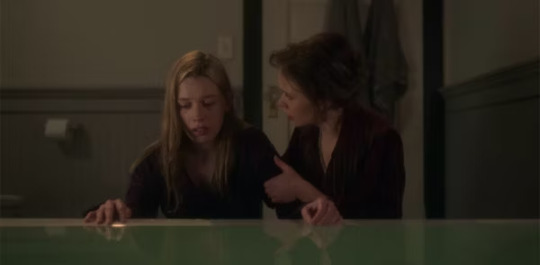
The Implications of Idealizing Self-Sacrifice as True Love
During a pivotal conversation in one of the show’s early episodes, Dani and Jamie discuss the “wrong kind of love” that existed between Rebecca Jessel and Peter Quint. Jamie remarks on how she “understands why so many people mix up love and possession,” thereby characterizing Rebecca and Peter’s romance as a matter of possession—as well as hinting, perhaps, that Jamie herself has had experiences with this in her own past. After considering for a moment, Dani agrees: “People do, don’t they? Mix up love and possession. […] I don’t think that should be possible. I mean, they’re opposites, really, love and ownership.” We can already tell from this scene that Dani and Jamie are, themselves, heading towards a burgeoning romance—and that this contrast between love and possession (and their self-awareness of it) is going to become a defining feature of that romance.
Indeed, the show takes great pains to emphasize the genuine love that exists between Dani and Jamie against the damaging drive for possession enacted by characters like Peter (who consistently manipulates Rebecca and kills her to keep her ghost with him) and Viola (who has killed numerous people and trapped their souls at Bly over the centuries in a long since forgotten effort to reclaim her life with her husband and daughter from Perdita, her murderously jealous sister). These contrasts take multiple forms and emerge from multiple angles, all to establish that Dani and Jamie’s love is uniquely safe, caring, healing, mutually supportive, and built on a foundation of prevailing concern for the other’s wellbeing. Some of these contrasts are subtle and understated. Consider, for instance, how Hannah observes that Rebecca looks like she hasn’t slept in days because of the turmoil of her entanglements with Peter, whereas Jamie’s narration describes how Dani gets the best sleep of her life during the first night that she and Jamie spend together. Note, too, the editing work in Episode 6 that fades in and out between the memories of the destructive ramifications of Henry and Charlotte’s affair and the scenes of tender progression in Dani and Jamie’s romance. Other contrasts, though, are far more overt. Of course, one of the most blatant examples (and most pertinent to this analysis) is the very fact that the ghosts of Viola, Peter, and Rebecca are striving to reclaim the people they love and the lives that they’ve lost by literally possessing the bodies and existences of the living.
The role of consent is an important factor in these ghostly possessions and serves as a further contrast with Dani and Jamie’s relationship. Peter and Rebecca frequently possess Miles and Flora without their consent—at times, even, when the children explicitly tell them to stop or, at the very least, to provide them with warnings beforehand. While inhabiting the children, Peter and Rebecca go on to harm them and put them at risk (e.g. Peter smokes cigarettes while in Miles’s body; Rebecca leaves Flora alone and unconscious on the grounds outside the manor) and to commit acts of violence against others (e.g. Peter pushes Hannah into the well, killing her; Peter and Rebecca together attack Dani and restrain her). The “It’s you, it’s me, it’s us,” conceit—with which living people can invite Bly’s ghosts to possess them, the mechanism by which Dani breaks the curse of Bly’s gravity well—is a case of dubious consent at best and abusive, violent control at worst. (“I didn’t agree,” Rebecca says after Peter leaves her body, releasing his “invited” possession of her at the very moment that the lake’s waters start to fill her lungs).
Against these selfish possessions and wrong kinds of love, Jamie and Dani’s love is defined by their selfless refusal to possess one another. A key characteristic of their courtship involves them expressing vulnerability in ways that invite the other to make their own decisions about whether to accept and how to proceed (or not proceed). As we discussed earlier, Dani and Jamie’s first kiss happens after Dani opens up about her guilt surrounding her ex-fiancé’s death. Pausing that kiss, Jamie checks, “You sure?” and only continues after Dani answers with a spoken yes. (Let’s also take this moment to appreciate Amelia Eve’s excellent, whispered “Thank fuck,” that isn’t included in Netflix’s subtitles). Even so, Dani frantically breaks away from her just moments later. But Jamie accepts this and doesn’t push Dani to continue, believing, in fact, that Dani has withdrawn precisely because Jamie has pushed too much already. A week later, Dani takes the initiative to advance their budding romance by inviting Jamie out for a drink—which Jamie accepts by, instead, taking Dani to see her blooming moonflowers that very evening. There, in her own moment of vulnerability, Jamie shares her heart-wrenching and tumultuous backstory with Dani in order to “skip to the end” and spare Dani the effort of getting to know her. By openly sharing these difficult details about herself, Jamie evidently intends to provide Dani with information that would help her decide for herself whether she wants to continue their relationship or not.
Their shared refusal to possess reaches its ultimate culmination in that moment, all those years later, when Dani discovers just how close she’s come to strangling Jamie—and then leaves their home to travel all the way back to Bly and drown herself in the lake because she could “not risk her most important thing, her most important person.” Upon waking to find that Dani has left, Jamie immediately sets off to follow her back to Bly. And in an absolutely heartbreaking, beautiful scene, we see Jamie attempting the “you, me, us,” invitation, desperate for Dani to possess her, for Dani to take Jamie with her. (Y’all, I know I’m critiquing this scene right now, but I also fuckin’ love it, okay? Ugh. The sight of Jamie screaming into the water and helplessly grasping for Dani is gonna stay with me forever. brb while I go cry about it again). Dani, of course, refuses this plea. Because “Dani wouldn’t. Dani would never.” Further emphasizing the nobility of Dani’s actions, Jamie’s narration also reveals that Dani’s self-sacrificial death has not only spared Jamie alone, but has also enabled Dani to take the place of the Lady of the Lake and thereby ensure that no one else can be taken and possessed by Viola’s gravity well ever again.
And so we have the show’s ennoblement of Dani’s magnanimous self-sacrifice. By inviting Viola to possess her, drowning herself to keep from harming Jamie, and then refusing to possess Jamie or anyone else, Dani has effectively saved everyone: the children, the restive souls that have been trapped at Bly, anyone else who may ever come to Bly in the future, and the woman she loves most. Dani has also, then, broken the perpetuation of Bly’s cycles of possession and trauma with her selfless expression of love for Jamie.
The unfortunate effect of all of this is that, quite without meaning to (I think? I hope—), The Haunting of Bly Manor ends up stumbling headlong into a validation of suicide as a selfless act of true love, as a force of protection and salvation.
So, before we proceed, I just want to take this moment to say—definitively, emphatically, as someone who has survived and experienced firsthand the ineffably catastrophic consequences of suicide—that suicide is nothing remotely resembling a selfless “refusal to possess” or an act of love. I’m not going to harp extensively on this, though, because I’d rather not trigger myself for a second time (so far, lol) while writing this essay. Just take my fuckin’ word for it. And before anybody tries to hit me with some excuse like “But Squall, it isn’t that the show is valorizing suicide, it’s that Dani is literally protecting Jamie from Viola,” please consider that I’ve already discussed how the show’s depiction of this lent itself to my own noxious beliefs that “all I do is harm other people with my grief, so maybe I should stop talking to my friends so that they don’t have to deal with me anymore.” Please consider what these narrative details and their allegorical import might tell people who are struggling with their mental health—even if not with suicidal ideation, then with the notion that they should self-sacrificially remove themselves from relationships for the sake of sparing loved ones from (assumed) harm.
Okay, that said, now let’s proceed…‘cause I’ve got even more to say, ‘cause the more I mulled over these details, the more I also came to realize that Dani’s self-sacrificial death in Bly’s conclusion also has the unfortunate effect of undermining some of its other (attempted) themes and its queer representation.
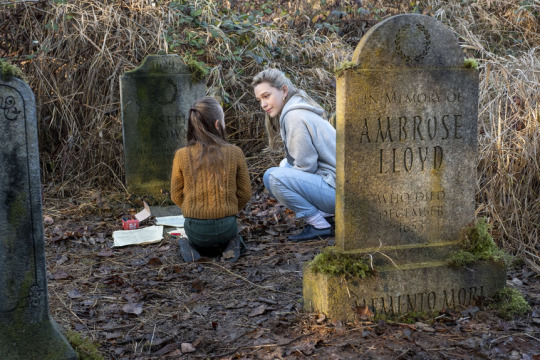
What Bly Manor Tries (and Fails) to Say about Grief and Acceptance
Let’s start by jumping back to a theme we’ve already addressed briefly: moving through one’s grief.
The Haunting of Bly Manor does, in fact, have a lot to say about this. Or…it wants to, more like. On the whole, it seems like it’s trying really hard to give us a cautionary tale about the destructive effects of unprocessed grief and the misplaced guilt that we can wind up carrying around when someone we love dies. The show spends a whole lot of time preaching about how important it is that we learn to accept our losses without allowing them to totally consume us—or without lingering around in denial about them (gettin’ some Kübler-Ross in here, y’all). Sadly, though, it does kind of a half-assed job of it…despite the fact that this is a major recurring theme and a component of the characterizations and storylines of, like, most of its characters. In fact, this fundamentally Kübler-Rossian understanding of what it means to move through grief and to accept loss and mortality appears to be the show’s guiding framework. During his rehearsal dinner speech in the first episode, Owen proclaims that, “To truly love another person is to accept that the work of loving them is worth the pain of losing them,” with such eerie resonance—as the camera stays set on Jamie’s unwavering gaze—that we know that what we’re about to experience is a story about accepting the inevitable losses of the people we love.
Bly Manor is chock full of characters who’re stuck in earlier stages of grief but aren’t really moving along to reach that acceptance stage. I mean, the whole cause of the main supernatural haunting is that Viola so ferociously refuses to accept her death and move on from her rage (brought about by Perdita’s resentment) that she spends centuries strangling whoever she comes across, which then effectively traps them there with her. And the other antagonistic ghostly forces, Rebecca and Peter, also obviously suck at accepting their own deaths, given that they actually believe that possessing two children is a perfectly fine (and splendid) way for them to grasp at some semblance of life again. (Actually…the more that I’ve thought about this, the more that I think each of the pre-acceptance stages of grief in Kübler-Ross’s model may even have a corresponding character to represent it: Hannah is denial; Viola is anger; Peter and Rebecca are bargaining; Henry is depression. Just a little something to chew on).
But let’s talk more at-length about this theme in relation to two characters we haven’t focused on yet: Hannah and Henry. For Hannah, this theme shows up in her struggles to accept that her husband, Sam, has left her (Charlotte wryly burns candles in the chapel as though marking his passing, while Hannah seems to be holding out hope that he might return) and in her persistent denial that Peter-as-Miles has killed her. As a ghost, she determinedly continues going about her daily life and chores even as she’s progressively losing her grip on reality. Henry, meanwhile, won’t issue official notifications of Dominic’s death and continues to collect his mail because doing otherwise would mean admitting to the true finality of Dominic’s loss. At the same time, he is so, completely consumed by his guilt about the role that he believes he played in Charlotte and Dominic’s deaths that he’s haunting himself with an evil alter-ego. His overriding guilt and despair also result in his refusal to be more present in Miles and Flora’s lives—even with the knowledge that Flora is actually his daughter.
In the end, both Hannah and Henry reach some critical moments of acceptance. But, honestly, the show doesn’t do a great job of bringing home this theme of move through your grief with either of them…or with anybody else, really. Peter basically winds up bullying Hannah into recognizing that her broken body is still at the bottom of the well—and then she accepts her own death right in time to make a completely abortive attempt at rescuing Dani and Flora. Henry finally has a preternatural Bad Feeling about things (something about a phone being disconnected? whose phone? Bly’s phone? his phone? I don’t understand), snaps to attention, and rushes to Bly right in time to make an equally abortive rescue attempt that leaves him incapacitated so that his not-quite-ghost can hang out with Hannah long enough to find out that she’s dead. But at least he decides to be an attentive uncle/dad to Miles and Flora after that, I guess. Otherwise, Hannah and Henry get handwaved away pretty quickly before we can really witness what their acceptance means for them in any meaningful detail. (I blame this on some sloppy writing and the way-too-long, all-about-Viola eighth episode. And, on that note, what about the “acceptances” of Rebecca, Peter, and Viola there at the end? Rebecca does get an interesting moment of acceptance—of a sort—with her offer to possess Flora in order to experience Flora’s imminent drowning for her, thereby sparing the child by tucking her in a happy memory. Peter just…disappears at the end with some way-too-late words of apology. Viola’s “acceptance,” however, is tricky…What she accepts is Dani’s invitation to inhabit her. More on this later).
Hannah and Henry’s stories appear to be part of the show’s efforts to warn us about the ways that unprocessed, all-consuming grief can cause us to miss opportunities to have meaningful relationships with others. Hannah doesn’t just miss her chance to be with Owen because…well, she’s dead, but also because of her unwillingness to move on from Sam beforehand. Her denial about her own death, in turn, prevents her from taking the opportunity as a ghost to tell Owen that she loves him. Henry, at least, does figure out that he’s about to lose his chance to be a caring parental figure to his daughter and nephew—but just barely. It takes the near-deaths of him and the children to finally prompt that realization.
Of the cast, Dani gets the most thorough and intentional development of this move through your grief theme. And, importantly, she learns this lesson in time to cultivate a meaningful relationship that she could’ve easily missed out on otherwise. As we’ve already discussed, a critical part of Dani’s character arc involves her realization that she has to directly confront Edmund’s death and start absolving herself of her guilt in order to open up the possibility of a romantic relationship with Jamie. In Episode 4, Jamie’s narration suggests that Dani has had a habit of putting off such difficult processes (whether in regards to moving through her grief, breaking off her engagement to Edmund, or coming to terms with her sexuality), as she’s been constantly deferring to “another night, another time for years and years.” Indeed, the show’s early episodes are largely devoted to showing the consequences of Dani’s deferrals and avoidances. From the very beginning, we see just how intrusively Dani’s unresolved guilt is impacting her daily life and functioning. She covers up mirrors to try to prevent herself from encountering Edmund’s haunting visage, yet still spots him in the reflections of windows and polished surfaces. Panic attacks seem to be regular occurrences for her, sparked by reminders of him. And all of this only gets worse and more disruptive as Dani starts acting on her attraction to Jamie.
It's only after Dani decides to begin moving through her grief and guilt that she’s able to start becoming emotionally and physically intimate with Jamie. And the major turning point for this comes during a scene that features a direct, explicit discussion of the importance of accepting (and even embracing) mortality.
That’s right—it’s time to talk about the moonflower scene.
In a very “I am extremely fed up with people not being able to deal with my traumatic past, so I’m going to tell you about all of the shit that I’ve been through so that you can go ahead and decide whether you want to bolt right now instead of just dropping me later on” move (which…legit, Jamie—I feel that), Jamie sits Dani down at her moonflower patch to give her the full rundown of her own personal backstory and worldview. Her monologue evinces both a profound cynicism and a profound valuation of human life…all of which is also suggestive, to me at least, of a traumatized person who at once desperately wishes for intimate connection, but who’s also been burned way too many times (something with which I am wholly unfamiliar, lol). She characterizes people as “exhaustive effort with very little to show for it,” only to go on to wax poetic about how human mortality is as beautiful as the ephemeral buds of a moonflower. This is, in essence, Jamie’s sorta convoluted way of articulating that whole “To truly love another person is to accept that the work of loving them is worth the pain of losing them” idea.
After detailing her own past, Jamie shifts gears to suggest that she believes that cultivating a relationship with Dani—like the devoted work of growing a tropical, transient Ipomoea alba in England—might be worth the effort. And as part of this cultivation work, Jamie then acknowledges Dani’s struggles with her guilt, while also firmly encouraging her to move through it by accepting the beauty of mortality:
“I know you’re carrying this guilt around, but I also know that you don’t decide who lives and who doesn’t. I’m sorry Dani, but you don’t. Humans are organic. It’s a fact. We’re meant to die. It’s natural…beautiful. […] We leave more life behind to take our place. Like this moonflower. It’s where all its beauty lies, you know. In the mortality of the thing.”
After that, Jamie and Dani are finally able to make out unimpeded.
Frustratingly, though, Jamie’s own dealings with grief, loss, and trauma remain terribly understated throughout the show. Her monologue in the moonflower scene is really the most insight that we ever get. Jamie consistently comes off as better equipped to contend with life’s hardships than many of Bly’s other characters; and she is, in fact, the sole member of the cast who is confirmed to have ever had any sort of professional therapy. She regularly demonstrates a remarkable sense of empathy and emotional awareness, able to pick up on others’ needs and then support them accordingly, though often in gruff, tough-love forms. Further, there are numerous scenes in which we see Jamie bestowing incisive guidance for handling difficult situations: the moonflower scene, her advice to Rebecca about contacting Henry after Peter’s disappearance, and her suggestion to Dani that Flora needs to see a psychologist, to name just a few. As such, Jamie appears to have—or, at least, projects—a sort of unflappable groundedness that sets her apart from everyone else in the show.
Bly only suggests that Jamie’s struggles run far deeper than she lets on. There are a few times that we witness quick-tempered outbursts (usually provoked by Miles) and hints of bottled-up rage. Lest we forget, although it was Flora who first found Rebecca’s dead body floating in the water, it was Jamie who then found them both immediately thereafter. We see this happen, but we never learn anything about the impact that this must have had on her. Indeed, Jamie’s exposure to the layered, compounding grief at Bly has no doubt inflicted a great deal of pain on her, suggested by details like her memorialization of Charlotte and Dominic during the bonfire scene. If we look past her flippancy, there must be more than a few grains of truth to that endless well of deep, inconsolable tears—but Jamie never actually shares what they might be. Moreover, although the moonflower scene reveals the complex traumas of her past, we never get any follow-up or elaboration about those details or Dani’s observation of the scar on her shoulder. For the most part, Jamie’s grief goes unspoken.
There’s a case to be made that these omissions are a byproduct of narrator Jamie decentering herself in a story whose primary focus is Dani. Narrator Jamie even claims that the story she’s telling “isn’t really my story. It belongs to someone I knew” (yes, it’s a diversionary tactic to keep us from learning her identity too soon—but she also means it). And in plenty of respects, the telling of the story is, itself, Jamie’s extended expression of her grief. By engaging in this act of oral storytelling to share Dani’s sacrifice with others—especially with those who would have otherwise forgotten—Jamie is performing an important ritual of mourning her wife. Still, it’s for exactly these reasons that I think it would’ve been valuable for the show to include more about the impacts that grief, loss, and trauma had on Jamie prior to Dani’s death. Jamie’s underdevelopment on this front feels more like a disappointing oversight of the show’s writing than her narrator self’s intentional, careful withholding of information. Additionally, I think that Bly leaves Jamie’s grieving on an…odd note (though, yes, I know I’m just a curmudgeonly outlier here). Those saccharine final moments of Jamie filling up the bathtub and sleeping on a chair so that she can face the cracked doorway are a little too heavy-handedly tear-jerking for my liking. And while this, too, may be a ritual of mourning after the undoubtedly taxing effort of telling Dani’s story, it may also suggest that Jamie is demurring her own acceptance of Dani’s death. Is the hand on her shoulder really Dani’s ghost? Or is it Jamie’s own hopeful fabrication that her wife’s spirit is watching over her? (Or—to counter my own point here and suggest a different alternative—could this latter idea (i.e. the imagining of Dani’s ghost) also be another valid manner of “accepting” a loss by preserving a loved one’s presence? “Dead doesn’t mean gone,” after all. …Anyway, maybe I would be more charitable to this scene if not for the hokey, totally out-of-place song. Coulda done without that, seriously).
But let’s jump back to the moonflower scene. For Dani, this marks an important moment in the progression of her own movement through grief. In combination, her newfound readiness to contend with her guilt and her eagerness to grow closer to Jamie enable Dani to find a sense of peace that she hasn’t experienced since Eddie’s death…or maybe ever, really (hang on to this thought for this essay’s final section, too). When she and Jamie sleep together for the first time, not only does Dani actually sleep well, but she also wakes the next morning to do something that she hasn’t done to that point and won’t do again: she comfortably looks into a mirror. (One small qualification to this: Dani does look into her own reflection at the diner when she and Jamie are on their road trip; Viola doesn’t interfere then, but whether this is actually a comfortable moment is questionable). Then, shifting her gaze away from her own reflection, she sees Jamie still sleeping soundly in her bed—and smiles. It’s a fleeting moment of peace. Immediately after that, she spots Flora out the window, which throws everything back into accumulating turmoil. But that moment of peace, however fleeting, is still a powerful one.
However, Bly teases this narrative about the possibilities of finding healing in the wake of traumatic loss—especially through the cultivation of meaningful and supportive relationships with others—only to then totally pull that rug out from under Dani in the final episode.
During that final episode, we see that Dani’s shared life with Jamie has supported her in coming to terms with Viola’s lurking presence, such that “at long last, deep within the au pair’s heart, there was peace. And that peace held for years, which is more than some of us ever get.” But it’s at the exact moment that that line of narration occurs that we then begin to witness Dani’s steady, inexorable decline. Sure, we could say that Dani “accepts” Viola’s intrusions and the unavoidable eventuality that the ghost will seize control of her. But this isn’t a healthy acceptance or even a depiction of the fraught relationships that we can have with grief and trauma as we continue to process them throughout our lives. At all. Instead, it’s a distinctive, destructive sense of fatalism.
“I’m not even scared of her anymore,” Dani tells Jamie as the flooded bathtub spills around them. “I just stare at her and it's getting harder and harder to see me. Maybe I should just accept that. Maybe I should just accept that and go.” Remember way back at the beginning of this essay when I pointed out that there’s a significant difference between “moving through one’s grief” and allowing one’s grief to become all-consuming? Well, by the time we reach the bathtub scene, Dani’s grief and trauma have completely overtaken her. Her “acceptance” is, thus, a fatalistic, catastrophizing determination that her trauma defines her existence, such that she believes that all she has left to do is give up her life in order to protect Jamie from her. For a less ghostly (and less suicidal ideation-y) and more real-life example to illustrate what I’m getting at here: this would be like me saying “I should just accept that I’m never going to be anything other than a traumatized mess and should stop reaching out to my friends so that I don’t keep hurting them by making them deal with what a mess I am.” If I said something like this, I suspect (hope) that you would tell me that this is not a productive acceptance, but a pernicious narrative that only hurts me and the people who care about me. Sadly, though, this kind of pernicious narrative is exactly what we get out of Bly’s ending allegory.
“But Squall,” you may be thinking, “this scene is representing how people who struggle with their mental health can actually feel. This is exactly what it can be like to have severe mental illness, even for folks who have strong support systems and healthy, meaningful relationships. And there’s value in showing that.”
And if you’re thinking that, then first of all—as I have indicated already—I am aware that this is what it can be like. Very aware. And second of all, you make a fair point, but…there are ways that the show could’ve represented this without concluding that representation with a suicide that it effectively valorizes. I’ll contend with this more in the final section, where I offer a few suggestions of other ways that Bly could’ve ended instead.
I just want to be absolutely clear that I’m not saying that I think all media portrayals of mental illness need to be hopeful or wholesome or end in “positive” ways. But what I am saying is that Bly’s conclusion offers a really fuckin’ bleak outlook on grief, trauma, and mental illness, especially when we fit that ending into the framework of the show’s other (attempted) core themes, as well as Dani’s earlier character development. It’s especially bleak to see this as someone with severe mental health issues and who has also lost a loved one to suicide—and as someone who desperately hopes that my life and worldview won’t always stay so darkly colored by my trauma.
Additionally, it’s also worth pausing here to acknowledge that fatalism is, in fact, a major theme of The Beast in the Jungle, the 1903 Henry James novella on which the ninth episode is loosely based. I confess that I’ve only read about this novella, but haven’t read the story itself. However, based on my (admittedly limited) understanding of it, there appears to be a significant thematic rupture between The Beast in the Jungle and The Haunting of Bly Manor in their treatments of fatalism. In the end of the novella, its protagonist, John Marcher, comes to the realization that his fatalism has been a horrible mistake that has caused him to completely miss out on an opportunity for love that was right in front of him all along. The tragic fate to which Marcher believed that he was doomed was, in the end, his own fatalism. Dani, in contrast, never has this moment of recognition, not only because her fatalism leads to her own death, but also because the show treats her fatalism not as something that keeps her from love, but instead as leading her towards a definitive act of love.
All of this is exactly why Dani’s portrayal has become so damn concerning to me, and why I don’t believe that Bly’s allegory of “this is what it’s like to live with mental illness and/or to love (and lose) someone who is mentally ill” is somehow value-neutral—or, worse, something worth celebrating.
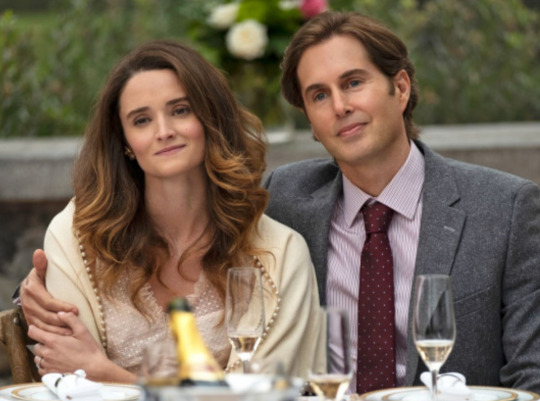
How Dani’s Self-Sacrifice Bears on Bly’s Queer Representation
In my dabblings around the fandom so far, I’ve seen a fair amount of deliberation about whether or not Bly Manor’s ending constitutes an example of the Bury Your Gays trope.
Honestly, though, I am super unenthused about rehashing those deliberations or splitting hairs trying to give some definitive “yes it is” or “no it isn’t” answer, so…I’m just not going to. Instead, I’m going to offer up some further observations about how Dani’s self-sacrificial death impinges on Bly’s queer representation, regardless of whether Bury Your Gays is at work here or not.
I would also like to humbly submit that the show could’ve just…not fucked around in proximity of that trope in the first place so that we wouldn’t even need to be having these conversations.
But anyway. I’m going to start this section off with a disclaimer.
Even though I’m leveling some pretty fierce critiques in this section (and across this essay), I do also want to say that I adore that The Haunting of Bly Manor and its creators gave us a narrative that centers two queer women and their romantic relationship as its driving forces and that intentionally sets out to portray the healing potentials of sapphic love as a contrast to the destructive, coercive harms found in many conventional dynamics of hegemonic heteronormativity. I don’t want to downplay that, because I’m extremely happy that this show exists, and I sincerely believe that many elements of its representation are potent and meaningful and amazing. But…I also have some reservations with this portrayal that I want to share. I critique not because I don’t love, but because I do love. I love this show a lot. I love Dani and Jamie a lot. I critique because I love and because I want more and better in future media.
So, that being said…let’s move on to talk about Dani, self-sacrifice, and compulsory heterosexuality.
Well before Dani’s ennobled death, Bly establishes self-sacrifice as a core component of her characterization. It’s hardwired into her, no doubt due to the relentless, entangled educational work of compulsory heterosexuality (comphet) and the aggressive forms of socialization that tell girls and women that their roles in life are to sacrifice themselves in order to please others and to belong to men. Indeed, Episode 4’s series of flashbacks emphasizes the interconnectedness between comphet and Dani’s beliefs that she is supposed to sacrifice herself for others’ sakes, revealing how these forces have shaped who she is and the decisions that she’s made across her life. (While we’re at it, let’s also not lose sight of the fact that Dani’s profession during this time period is one that—in American culture, at least—has come to rely on a distinctively feminized self-sacrificiality in order to function. Prior to becoming an au pair, Dani was a schoolteacher. In fact, in one of Episode 4’s flashbacks, Eddie’s mother points out that she appreciates Dani’s knack for identifying the kids that need her the most, but also reminds Dani that she needs to take care of herself…which suggests that Dani hadn’t been: “Save them all if you can, but put your own oxygen mask on first”).
In the flashback of her engagement party, Dani’s visible discomfort during Edmund’s speech clues us in that she wasn’t preparing to marry him because she genuinely wanted to, but because she felt like she was supposed to. The “childhood sweethearts” narrative bears down on the couple, celebrated by their friends and family, vaunted by cultural constructs that prize this life trajectory as a cherished, “happily ever after” ideal. Further illustrating the pressures to which Dani had been subject, the same scene shows Eddie’s mother, Judy O’Mara, presenting Dani with her own wedding dress and asking Dani to wear it when she marries Eddie. Despite Mrs. O’Mara’s assurances that Dani can say no, the hopes that she heaps onto Dani make abundantly clear that anything other than a yes would disappoint her. Later, another flashback shows Dani having that dress sized and fitted while her mother and Mrs. O’Mara look on and chatter about their own weddings and marriages. Their conversation is imbued with further hopes that Dani’s marriage to Edmund will improve on the mistakes that they made in their lives. Meanwhile, Dani’s attentiveness to the tailor who takes her measurements, compliments her body, and places a hand on her back strongly suggests that Dani is suppressing her attraction to women. Though brief, this scene is a weighty demonstration of the ways that the enclosures of heteronormativity constrain women into believing that their only option is to deny homosexual attraction, to forfeit their own desires in order to remain in relationships with men, and to prioritize the hopes and dreams and aspirations of the people around them above their own.
Dani followed this pathway—determined for her by everyone else except herself—until she couldn’t anymore.
During the flashback of their breakup, Dani explains to Eddie that she didn’t end their relationship sooner because she thought that even just having desires that didn’t match his and his family’s was selfish of her: “I should’ve said something sooner. […] I didn’t want to hurt you, or your mom, or your family. And then it was just what we were doing. […] I just thought I was being selfish, that I could just stick it out, and eventually I would feel how I was supposed to.” As happens to so many women, Dani was on the cusp of sacrificing her life for the sake of “sticking out” a marriage to a man, all because she so deeply believed that it was her duty to satisfy everyone’s expectations of her and that it was her responsibility to change her own feelings about that plight.
And Eddie’s response to this is telling. “Fuck you, Danielle,” he says. “Why are you doing this to me?”
Pay close attention to those last two words. Underline ‘em. Bold ‘em. Italicize ‘em.
“Why are you doing this to me?”
With those two words, Eddie indicates that he views Dani’s refusal to marry him as something that she is doing to him, a harm that she is committing against him. It is as though Dani is inflicting her will on him, or even that she is unjustly attackinghim by finally admitting that her desires run contrary to his own, that she doesn’t want to be his wife. And with this statement, he confirms precisely what she anticipated would happen upon giving voice to her true feelings.
What space did Edmund, his family, or Dani’s mother ever grant for Dani to have aspirations of her own that weren’t towards the preordained role of Eddie’s future wife? Let’s jump back to that engagement party. Eddie’s entire speech reveals a very longstanding assumption of his claim over her as his wife-to-be. He’d first asked Dani to marry him when they were ten years old, after he mistakenly believed that their first kiss could get Dani pregnant; Dani turned him down then, saying that they were too young. So, over the years, as they got older, Eddie continued to repeatedly ask her—until, presumably, she relented. “Now, we’re still pretty young,” he remarks as he concludes his speech, “but I think we’re old enough to know what we want.” Significantly, Eddie speaks here not just for himself, but also for Dani. Dani’s voice throughout the entire party is notably absent, as Eddie and his mother both impose their own wishes on her, assume that she wants what they want, and don’t really open any possibility for her to say otherwise. Moreover, although there’s a palpable awkwardness that accompanies Eddie’s story, the crowd at the party chuckles along as though it’s a sweet, innocent tale of lifelong love and devotion, and not an instance of a man whittling away at a woman’s resistance until she finally caved to his pursuit of her.
All of this suggests that Eddie shared in the socialized convictions of heteropatriarchy, according to which Dani’s purpose and destiny were to marry him and to make him happy. His patterns of behavior evince the unquestioned presumptions of so many men: that women exist in service to them and their wants, such that it is utterly inconceivable that women could possibly desire otherwise. As a political institution, heteropatriarchy tells men that they are entitled to women’s existences, bodies, futures. And, indeed, Eddie can’t seem to even imagine that Dani could ever want anything other than the future that he has mapped out for them. (Oh, hey look, we’ve got some love vs. possession going on here again).
For what it’s worth, I think that the show’s portrayal of compulsory heterosexuality is excellent. I love that the writers decided to tackle this. Like I mentioned at the beginning, I found all of this to be extremelyrelatable. I might even be accused of over-relating and projecting my own experiences onto my readings here, but…there were just too many resonances between Dani’s experiences and my own. Mrs. O’Mara’s advice to Dani to “put your own oxygen mask on first” is all too reminiscent of the ways that my ex’s parents would encourage me to “heal” from my brother’s loss…but not for the sake of my own wellbeing, but so that I would return to prioritizing the care of their son and existing to do whatever would make him happy. I’ll also share here that what drove me to break up with my ex-fiancé wasn’t just his unwillingness to contend with my grief, but the fact that he had decided that the best way for me to heal from my loss would be to have a baby. He insisted that I could counteract my brother’s death by “bringing new life into the world.” And he would not take no for an answer. He told me that if I wouldn’t agree to try to have children in the near future, then he wasn’t interested in continuing to stay with me. It took me months to pluck up the courage, but I finally answered this ultimatum by ending our relationship myself. Thus, like Dani, I came very close to sacrificing myself, my wants, my body, my future, and my life for the sake of doing what my fiancé and his family wanted me to do, all while painfully denying my own attraction to women. What kept me from “sticking it out” any longer was that I finally decided that I wasn’t going to sacrifice myself for a man I didn’t love (and who clearly didn’t love me) and decided, instead, to reclaim my own wants and needs away from him.
For Dani, however, the moment that she finally begins to reclaim her wants and needs away from Eddie is also the moment that he furiously jumps out of the driver’s seat and into the path of a passing truck, which leaves her to entangle those events as though his death is her fault for finally asserting herself.
Of course, the guilt that Dani feels for having “caused” Eddie’s death isn’t justa matter of breaking up with him and thereby provoking a reaction that would prove fatal—it’s also the guilt of her suppressed homosexual desire, of not desiring Eddie in the first place. In other words, internalized homophobia is an inextricable layer of the culpability that Dani feels. Internalized homophobia is also what’s haunting her. As others (such as Rowan Ellis, whose deep dive includes a solid discussion of internalized homophobia in Bly, as well as a more at-length examination of Bury Your Gays than I’m providing here) have pointed out, the show highlights this metaphorically by having Dani literally get locked into a closet with Edmund’s ghost in the very first episode. Further reinforcing this idea is the fact that these spectral visions get even worse as Dani starts to come to terms with and act on her attraction to Jamie, as though the ghost is punishing her for her desires. Across Episode 3, as Dani and Jamie begin spending more time together, Edmund’s ghost concurrently begins materializing in more shocking, visceral forms (e.g. his bleeding hand in Dani’s bed; his shadowy figure lurking behind Dani after she’s held Jamie’s hand) that exceed the reflective surfaces to which he’d previously been confined. This continues into Episode 4, where each of Eddie’s appearances follows moments of Dani’s growing closeness to Jamie. A particularly alarming instance occurs when Dani just can’t seem to pry her gaze away from a dressed-up Jamie who’s in the process of some mild undressing. Finally turning away from Jamie, Dani becomes aware of Eddie’s hands on her hips. It’s a violating reminder of his claims over her, horrifying in its invocation of men’s efforts to coerce and control women’s sexuality.
It is incredibly powerful, then, to watch Dani answer all of this by becoming more resolute and assertive in the expression of her wants and needs. The establishment of her romantic relationship with Jamie isn’t just the movement through grief and guilt that we discussed earlier; it’s also Dani’s defiance of compulsory heterosexuality and her fierce claiming of her queer existence. Even in the face of all that’s been haunting her, Dani initiates her first kiss with Jamie; and Eddie’s intrusion in that moment is only enough to temporarily dissuade her, as Dani follows this up by then asking Jamie out for a drink at the pub to “see where that takes them” (i.e. up to Jamie’s flat to bang, obviously). The peace that Dani finds after having sex with Jamie for the first time is, therefore, also the profound fulfillment of at last having her first sexual experience with a woman, of finally giving expression to this critical part of herself that she’d spent her entire life denying. Compulsory heterosexuality had dictated to Dani that she must self-sacrifice to meet the strictures of heteropatriarchy, to please everyone except herself; but in her relationship with Jamie, Dani learns that she doesn’t have to do this at all. This is only bolstered by the fact that, as we’ve talked about at length already, Jamie is very attentive to Dani’s needs and respectful of her boundaries. Jamie doesn’t want Dani to do anything other than what Dani wants to do. And so, in the cultivation of their romantic partnership, Dani thus comes to value her own wants and needs in a way that she hasn’t before.
The fact that the show nails all of this so fucking well is what makes all that comes later so goddamn frustrating.
The final episode chronicles Dani and Jamie forging a queer life together that the rest of us can only dream of, including another scene of Dani flouting homophobia and negotiating her own internal struggles so that she can be with Jamie. “I know we can’t technically get married,” she tells Jamie when she proposes to her, “but I also don’t really care.” And with her awareness that the beast in the jungle is starting to catch up with her, Dani tells Jamie that she wants to spend whatever time she has left with her.
But then…
A few scenes later—along with a jump of a few years later, presumably—Jamie arrives home with the licenses that legally certify their civil union in the state of Vermont. It’s a monumental moment. In 2000, Vermont became the first state to introduce civil unions, which paved the way for it to later (in 2009) become the first state to pass legislation that recognized gay marriages without needing to have a court order mandating that the state extend marriage rights beyond opposite-sex couples. I appreciate that Bly’s creatorsincorporated this significant milestone in the history of American queer rights into the show. But its positioning in the show also fuckin’ sucks. Just as Jamie is announcing the legality of her and Dani’s civil union and declaring that they’ll have another marriage ceremony soon, we see water running into the hallway. This moves us into that scene with the flooded bathtub, as Jamie finds Dani staring into the water, unaware of anything else except the reflection of Viola staring back at her. Thus, it is at the exact moment when her wife proudly shares the news of this incredible achievement in the struggle for queer rights—for which queer folks have long fought and are continuing to fight to protect in the present—that Dani has completely, hopelessly resigned herself to Viola’s possession.
I want to be careful to clarify here that, in making this observation, I don’t mean to posit some sort of “Dani should have fought back against Viola” argument, which—within the context of our allegorical readings—might have the effect of damagingly suggesting that Dani should have fought harder to recover from mental illness or terminal disease. But I do mean to point out the incredibly grim implications that the juxtaposition of these events engenders, especially when we contemplate them (as we did in the previous section) within the overall frameworks of the show’s themes and Dani’s character development. After all that has come before, after we’ve watched Dani come to so boldly assert her queer desire and existence, it is devastating to see the show reduce her to such a despairing state that doesn’t even give her a chance to register that she and Jamie are now legal partners.
Why did you have to do this, Bly? Why?
Further compounding this despair, the next scene features the resumption of Dani’s self-sacrificial beliefs and behaviors, which results in her demise, and which leaves Jamie to suffer through the devastation of her wife’s death. This resumption of self-sacrifice hence demolishes all of that beautiful work of asserting Dani’s queer existence and learning that she doesn’t need to sacrifice herself that I just devoted two thousand words to describing above.
Additionally, in the end, Dani’s noble self-sacrifice also effects a safe recuperation of heteronormativity…which might add more evidence to a Bury Your Gays claim, oops.
And that is because, in the end, after we see Jamie screaming into the water and Dani forever interred at the bottom of the lake in which she drowned herself, we come to the end of Jamie’s story and return to Bly Manor’s frame narrative: Flora’s wedding.
At the start of the show, the evening of Flora and Unnamed Man’s (Wikipedia says his name is James? idk, w/e) rehearsal dinner provides the occasion and impetus for Jamie’s storytelling. Following dinner, Flora, her fiancé, and their guests gather around a fireplace and discuss a ghost story about the venue, a former convent. With a captive audience that includes her primary targets—Flora and Miles, who have forgotten what happened at Bly and, by extension, all that Dani sacrificed and that Jamie lost so that they could live their lives free of the trauma of what transpired—and with a topically relevant conversation already ongoing, Jamie interjects that she has a ghost story of her own to share…and thus, the show’s longer, secondary narrative begins.
When Jamie’s tale winds to a close at the end of the ninth episode, the show returns us to its frame, that scene in front of the cozy, crackling fire. And it is there that we learn that it is, in fact, Jamie who has been telling us this story all along.
As the other guests trickle away, Flora stays behind to talk to Jamie on her own. A critical conversation then ensues between them, which functions not only as Jamie’s shared wisdom to Flora, but also as the show’s attempt to lead viewers through what they’ve just experienced and thereby impart its core message about the secondary narrative. The frame narrative is, thus, also a direct address to the audience that tells us what we should take away from the experience. By this point, the show has thoroughly established that Jamie is a gentle-but-tough-love, knowledgeable, and trustworthy guide through the trials of accepting grief and mortality, and so it is Jamie who leaves Flora and us, the audience, with the show’s final word about how to treasure the people we love while they are still in our lives and how to grieve them if we survive beyond them. (But, by this point in this essay, we’ve also learned that Bly’s messages about grief and mortality are beautiful but also messy and unconvincing, even with this didactic ending moment).
With all of this in mind, we can (and should) ask some additional questions of the frame narrative.
One of those questions is: Why is the secondary narrative being told from/within this particular frame?
Answering this question within the show’s diegesis (by asking it of the narrator) is easy enough. Jamie is performing a memorialization of Dani’s life and sacrifice at an event where her intended audience happens to be gathered, ensuring that Miles and Flora begin to recognize what Dani did for them in a manner that maybe won’t just outright traumatize them.
Okay, sure, yeah. True. Not wrong.
But let’s interrogate this question more deeply—let’s ask it of the show itself. So, Bly Manor: Why is the secondary narrative being told from/within this particular frame?
We could also tweak this question a bit to further consider: What is the purpose of the frame? A frame narrative can function to shape audiences’ interpretations of and attitudes towards the secondary narrative. So, in this case, let’s make our line of questioning even more specific. What does the frame of Flora’s wedding do for Bly’s audiences?
Crucially, the framing scene at the fireplace provides us with a sense that we’ve returned to safety after the horror of the ghost story we’ve just experienced. To further assure us of this safety, then, Bly’s frame aims to restore a sense of normality, a sense that the threat that has provoked fear in us has been neutralized, a sense of hope that endures beyond tragedy. Indeed, as we fade from the secondary narrative and return to the frame, Jamie’s narration emphasizes how Dani’s selfless death has brought peace to Bly Manor by breaking its cycles of violence and trauma: “But she won’t be hollow or empty, and she won’t pull others to her fate. She will merely walk the grounds of Bly, harmless as a dove for all of her days, leaving the only trace of who she once was in the memory of the woman who loved her most.”
What Dani has accomplished with her self-sacrifice, then, is a longstanding, prevailing, expected staple of Western—and especially American—storytelling: redemption.
American media is rife with examples of this narrative formula (in which an individual must take selfless action—which may or may not involve self-sacrificial death—in order to redeem an imperiled community by restoring a threatened order) to an extent that is kind of impossible to overstate. Variations of this formula are everywhere, from film to television to comics to videogames to news reports. It is absolutely fundamental to our cultural understandings of what “heroism” means. And it’s been this way for, umm…a long time, largely thanks to that most foundational figure of Western myth, some guy who was crucified for everybody’s sins or something. (Well, that and the related popularization of Joseph Campbell’s hero’s journey, but…I’m not gonna go off onto a whole rant about that right now, this essay is already too long as it is).
In Bly Manor, the threatened order is the natural process of death itself, which Viola has disrupted with a gravity well that traps souls and keeps them suspended within physical proximity of the manor. Dani’s invitation to Viola is the initial step towards salvation (although, I think it’s important to note that this is not entirely intentional on Dani’s part. Jamie’s narration indicates that Dani didn’t entirely understand what she was doing with the “It’s you, it’s me, it’s us” invitation, so self-sacrifice was not necessarily her initial goal). It nullifies the gravity well and resumes the passage of death, which liberates all of the souls that have been trapped at Bly and also produces additional opportunities for others’ atonements (e.g. Peter’s apology to Miles; Henry’s guardianship of the children). But it’s Dani’s suicide that is the ultimate completion of the redemptive task. It is only by “giving herself to the lake” that Dani is able to definitively dispel Viola’s threat and confer redemptive peace to Bly Manor.
It’s tempting to celebrate this incredibly rare instance of a queer woman in the heroic-redemptive role, given that American media overwhelmingly reserve it for straight men. But I want to strongly advise that we resist this temptation. Frankly, there’s a lot about the conventional heroic-redemptive narrative formula that sucks, and I’d rather that we work to advocate for other kinds of narratives, instead of just championing more “diversity” within this stuffy old model of heroism. Explaining what sucks about this formula is beyond the purview of this essay, though. But my next point might help to illustrate part of why it sucks (spoiler: it’s because it tends to prop up traditional, dominant structures of power and relationality).
So…What I want us to do is entertain the possibility that Dani’s redemptive self-sacrifice might serve specific purposes for straight audiences, especially in the return to the frame at the end.
Across The Haunting of Bly Manor, we’ve seen ample examples of heterosexuality gone awry. The show has repeatedly called our attention to the flaws and failings of heterosexual relationships against the carefully cultivated safety, open communication, and mutual fulfillment of a queer romance between two women. But, while queer audiences may celebrate this about this show, for straight audiences, this whole situation might just wind up producing anxiety instead—as though heterosexuality is also a threatened order within the world of Bly Manor. More generally, asking straight audiences to connect with a queer couple as the show’s main protagonists is an unaccustomed challenge with which they’re not normally tasked; thus, the show risks leaving this dominant viewer base uncomfortable, threatened, and resentful, sitting with the looming question of whether heterosexuality is, itself, redeemable.
In answer to this, Dani’s self-sacrifice provides multiple assurances to straight audiences. To begin with, her assumption of the traditional heroic-redemptive role secures audiences within the familiar confines of that narrative formula, which also then promises that Dani is acting as a protector of threatened status quos and not as another source of peril. What Bly Manor is doing here is, in effect, acknowledging that it may have challenged (and even threatened) straight audiences with its centerpiece of a queer romance—and that, likewise, queers themselves may be challenging the status quos of romantic partnerships by, for instance, demanding marriage rights and improvements in media representations—while also emphatically reassuring those audiences in the wake of that challenge that Dani and Jamie haven’t created and aren’t going to create too much disturbance with their queerness. They’re really not that threatening, Bly swears. They’re harmless as a dove. They’re wholesome. They’re respectable. They—and queer folks more generally—aren’t going to totally upend everything, really. Look, they’ll even sacrifice themselves to save everyone and redeem imperiled communities and threatened orders—even heterosexuality itself!
A critical step towards achieving this assurance is the leveling of the playing field. In order for the show to neutralize the threat of queerness for straight audiences, comfort them with a return to safety, and promise them that heterosexuality is redeemable, the queer women need to have an on-screen tragic end to their relationship just like all of the straight couples have. And so, Dani must die and Jamie must grieve.
That accomplished, the show then immediately returns to the frame, the scene at the fireplace following Flora’s rehearsal dinner.
There—after we’ve witnessed so much queer joy and queer tragedy crammed into this final episode—we see Flora and her fiancé, bride and groom, sitting together, arms linked, taking in all that Jamie has to tell them. And with this warm, idyllic image of impending matrimony between man and wife, the safety to which straight audiences return in the frame is, therefore, also the safety of a heterosexuality that can find its redemption through Dani’s self-sacrifice. Not only does Dani’s death mean that Flora can live (and go on to marry her perfectly bland, unremarkable husband, all without the trauma of what happened at Bly), but it also means that she—and, with her, straight audiences—can ultimately benefit from the lessons about true love, loss, and grieving that Dani’s self-sacrifice and Jamie’s story bestow.
And so, Bly Manor concludes with a valorization of redemptive self-sacrifice and an anodyne recuperation of heteronormativity, bequeathing Flora with the opportunities to have and to hold the experiential knowledge that Dani and Jamie have provided for her. Here, queer tragedy serves up an educational opportunity for heterosexual audiences in a challengingly “inclusive,” but otherwise essentially non-threatening manner. The ending is a gentle, non-traumatizing, yet frank lesson to heterosexual audiences in the same way that Jamie’s story is a gentle, non-traumatizing, yet frank lesson to Flora.
Did the show’s creators intentionally do all of this to set about providing such assurances to straight audiences? Maybe. Maybe not. I don’t really know—or care! But, especially in light of incidents like the recent “Suletta and Miorine’s relationship is up to interpretation” controversy following the Gundam: Witch from Mercury finale, I absolutely do not put it past media corporations and content creators to very intentionally take steps to prioritize the comfort of straight audiences against the threats of queer love. And anyway, intentional or not, all of this still has effects and implications loaded with meaning, as I have tried to account for here.
Honestly, though, I can’t quite shake the feeling that there’s some tension between Jamie, Owen, and maybe also Henry about Jamie’s decision to publicly share Dani’s story in front of Flora and Miles. Owen’s abrupt declaration that it’s getting late and that they should wrap up seems like an intervention—like he’s been as patient and understanding as he possibly could up to that point, but now, he’s finally having to put a stop to Jamie’s deviance. I can’t help but read the meaningful stares that pass between them at both ends of the frame as a complex mixture of compassion and fraught disagreement (and I wish that the show had done more with this). The scene where Dani and Jamie visit Owen at his restaurant seems to set up the potential for this unspoken dispute. By their expressions and mannerisms (Dani’s stony stare; the protective way that Jamie holds her as her own gaze is locked on Dani), it’s clear that Dani and Jamie are aghast that Flora and Miles have forgotten what happened and that Owen believes that they should just be able to live their lives without that knowledge. And it’s also clear, by her very telling of Dani’s story, that Jamie disagrees with him. Maybe I’m over-imposing my own attitudes here, but I’m left with the impression that Jamie resents the coddling of Miles and Flora just like I’m resenting the coddling of straight audiences…that Jamie resents that she and Dani have had to give up everything so that Miles and Flora can continue living their privileged lives just like I’m resenting the exploitation of queer tragedy for the sake preserving straight innocence. (As Jamie says to Hannah when Dani puts the children to work in the garden: “You can’t give them a pass forever.” Disclaimer: I’m not saying that I want Miles and Flora to be traumatized, but I am saying that I agree with Jamie, because hiding traumatic shit is not how to resolve inter-generational trauma. Anyway—).
Also, I don’t know about y’all, but I find Flora and Jamie’s concluding conversation to be super cringe. Maybe it’s because I’m gay and just have way too much firsthand experience with this sort of thing from my own comphet past, but Flora’s whole “I just keep thinking about that silly, gorgeous, insane man I’m marrying tomorrow. I love him. More than I ever thought I could love anybody. And the crazy thing is, he loves me the same exact amount,” spiel just absolutely screams “woman who is having to do all of the emotional work in her relationship with an absolutely dull, mediocre, emotionally illiterate man and is desperately trying to convince herself that he does, in fact, love her as much as she (believes) that she loves him.”
I feel like this is a parody of straightness?? Is this actually sincere??
This is what Dani gave up her life to redeem??
To me, this is just more bleak shit that Bly leaves us with. It is so painful to watch.
Bless.
Okay, so I know that I said that I wasn’t going to offer a definitive yes or no about whether Bly commits Bury Your Gays with Dani’s death, but…after writing all of this out, I’m honestly kinda leaning towards a yes.
But I’m already anticipating that folks are gonna push back against me on this. So I just want to humbly submit, again, that Bly could have just not done this. It could have just not portrayed Dani’s death at all.
To really drive this point home, then, I’m going to conclude this essay by suggesting just a few ways that The Haunting of Bly Manor could have ended without Dani’s self-sacrificial death—or without depicting her death on-screen at all.
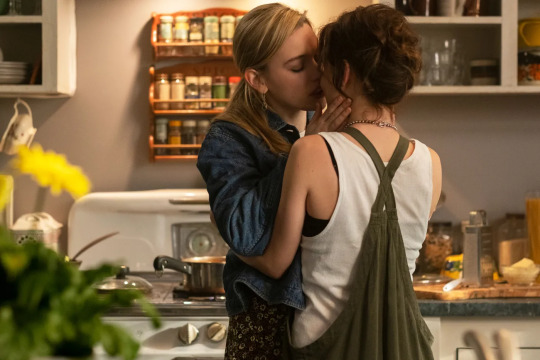
Bly Manor Could Have Ended Differently
Mike Flanagan—creator, director, writer, editor, executive producer, showrunner, etc. of The Haunting of Bly Manor—has stated that he believes that the show’s ending is a happy one.
I, on the other hand, believe that Bly’s ending is…not. In my view, the way that the ending treats Dani is unnecessarily cruel and exploitative. “Happy ending”—really? If I let myself be cynical about it (which I do), I honestly think that Dani’s death is a pretty damn transparent effort to squeeze out some tears with a sloppy, mawkish, feel-good veneer slapped over it. And if we peel back that veneer and look under it, what we find is quite bleak.
To be fair, for a psychological horror show that’s so centrally about grief and trauma, Bly Manor does seem to profess an incredibly strong sense of hopefulness. Underlying the entirety of the show is a profound faith in all the good and beauty that can come from human connection, however fleeting our lives may be—and even if we make a ton of dumb, awful mistakes along the way. If I’m being less cynical about it, I do also think that the show’s ending strives to demonstrate a peak expression of this conviction. But—at least in my opinion—it doesn’t succeed in this goal. In my writing of this essay, I’ve come to believe that the show instead ends in a state of despair that is at odds with what it appears to want to achieve.
So, in this final section, I’m going to offer up a few possibilities for ways that the show could have ended that maybe wouldn’t have so thoroughly undermined its own attempted messages.
Now, if I were actually going to fix the ending of The Haunting of Bly Manor, I would honestly overhaul a ton of the show to arrive at something completely different. But I’m not going to go through all the trouble of rewriting the entire show here, lol. Instead, I’m going to work with most of what’s already there, leading out from Viola’s possession of Dani (even though I don’t actually like that part of the show either – maybe someday I’ll write about other implications of Viola’s possession of Dani beyond these allegorical readings, but not right now). I’m also going to try to adhere to some of the show’s core themes and build on some of the allegorical possibilities that are already in place. Granted, the ideas that I pose here wouldn’t fix everything, by any stretch of the imagination; but they would, at least (I hope), mitigate some of the issues that I’ve outlined over the course of this essay. And one way or another, I hope that they’ll help to demonstrate that Dani’s self-sacrificial death was completely unnecessary. (Seriously, just not including Dani’s death would’ve enabled the show to completely dodge the question of Bury Your Gays and would’ve otherwise gone a long way towards avoiding the problems with the show’s queer representation).
So, here's how this is going to work. First, I’m going to pose a few general, guiding questions before then proposing an overarching thematic modification that expands on an idea that’s already prominent across the show. This will then serve as the groundwork for two alternative scenarios. I’m not going to go super into detail with either of these alternatives; mostly, I just want to demonstrate that the show that could’ve easily replaced the situation leading to Dani drowning herself. (For the record, I also think that the show could’ve benefitted from having at least one additional episode—and from some timing and pacing restructuring otherwise. So, before anybody tries an excuse like “but this wouldn’t fit into the last episode,” I want to urge that we imagine these possibilities beyond that limitation).
Let’s start off by returning to a point that I raised in the earlier conversation about grief and acceptance: the trickiness of Viola’s “acceptance.”
What Viola “accepts” in the end aren’t her losses or her own mortality, but Dani’s desperate, last-ditch-effort invitation to inhabit her. Within the show’s extant ending, Viola never actually comes to any kind of acceptance otherwise. Dani’s suicide effectively forces her dissolution, eradicating her persistent presence through the redemptive power of self-sacrifice. But in all of my viewings of the show and in all of my efforts to think through and write about it, there’s a question that’s been bugging me to no end: Why does Viola accept Dani’s invitation in the first place?
We know that Peter figured out the “it’s you, it’s me, it’s us” trick in his desperation to return to some form of life and to leave the grounds of Bly Manor. But…what is the appeal of it for Viola? How do her own motivations factor into it? For so long, Viola’s soul has been tenaciously persisting at Bly all so that she can repeatedly return to the physical locus of her connection with her husband and daughter, their shared bedroom in the manor. She’s done this for so long that she no longer even remembers why she’s doing it—she just goes back there to grab whatever child she can find and strangles whoever happens to get in her way. So what would compel her to accept Dani’s invitation? What does she get out of it—and what does she want out of it? What does her acceptance mean? And why, then, does her acceptance result in the dissipation of the gravity well?
We can conjecture, certainly. But the show doesn’t actually provide answers to these questions. Indeed, one of the other major criticisms that I have of Bly is that it confines all of Viola’s development to the eighth episode alone. I really think that it needed to have done way more to characterize her threat and at least gestureat her history sooner, rather than leaving it all to that penultimate episode, interrupting and drawing out the exact moment when she’s about to kill Dani. (Like, after centuries of Viola indiscriminately killing people, and with so many ghosts that’ve been loitering around for so long because of that, wouldn’t Bly Manor have rampant ghost stories floating around about it by the time Dani arrives? But there’s only one minor suggestion of that possibility: Henry indicating that he might’ve met a soldier ghost once. That’s it. And on that note, all of the ghosts at the manor needed to have had more screentime and development, really). Further, it’s disappointing that the show devotes that entire eighth episode to accounting for Viola’s motivations, only to then reduce her to Big, Bad, Unspeakable Evil in the final episode, with no rhyme or reason for what she’s doing, all so that she can necessitate Dani’s death.
As we continue pondering these unanswered questions, there’s also another issue that I want to raise, which the show abandons only as an oblique, obscure consideration. And that is: How the hell did Jamie acquire all that extensive knowledge about Viola, the ghosts of the manor, and all that happened, such that she is able to tell Bly’sstory in such rich detail? My own sort of headcanon answer to this is that Viola’s possession of Dani somehow enabled Viola to regain some of her own memories—as well as, perhaps, a more extended, yet also limited awareness of the enduring consciousnesses of the other ghosts—while also, in turn, giving Dani access to them, too. Dani then could have divulged what she learned to Jamie, which would account for how Jamie knows so much. I bring this up because it provides one possible response to the question of “What does Viola get out of her possession of Dani?” (especially given the significant weight that the show places on the retention of one’s memories—more on this in a moment) and because this is an important basis for both of my proposed alternative scenarios.
Before we dig into those alternative scenarios, however, there’s also a thematic modification that I want to suggest, which would help to provide another answer to “What does Viola get out of her possession of Dani?” while also alleviating the issues that lead into the valorization of Dani’s suicide. That thematic modification involves how the show defines love. Although Bly’s sustained contrasts between love and possession have some valuable elements, I think that the ending would’ve benefitted from downplaying the love vs. possession theme (which is where we run into so much trouble with Dani’s self-sacrifice, and which has also resulted in some celebratory conflations between “selflessness” and self-sacrifice that I’ve seen crop up in commentary about the show—but, y’all, self-sacrifice is not something to celebrate in romantic partnerships, so please, please be careful idolizing that) to instead play up a different theme: the idea that love is the experience of feeling such safety and security with another person that we can find opportunities for peace by being with them.
Seeking peace—and people with whom to feel safe enough to share traumas and experience peace—is a theme that already runs rampant across the show, so this modification is really just a matter of accentuating it differently. It’s also closely linked to the moving through grief theme that we’ve already discussed at length, as numerous characters in Bly express desires for solitude with loved ones as a way of finding relief and healing from their pain, grief, and trauma. (And I suspect that I latched onto this because I have desperately wanted peace, calm, and stillness in the midst of my own acute, compounding traumas…and because my own former romantic partner was obviously not someone with whom I felt safe enough to experience the kind of peace that would’ve allowed me to begin the process of healing).
We run into this idea early in the development of Jamie and Dani’s romance, as narrator Jamie explains in the scene leading up to their first kiss, “The au pair was tired. She’d been tired for so long. Yet without even realizing she was doing it, she found herself taking her own advice that she’d given to Miles. She’d chosen someone to keep close to her that she could feel tired around.” Following this moment, at the beginning of Episode 5, narrator Jamie then foregrounds Hannah’s search for peace (“The housekeeper knew, more than most, that deep experience was never peaceful. And because she knew this ever since she’d first called Bly home, she would always find her way back to peace within her daily routine, and it had always worked”), which calls our attention to the ways that Hannah has been retreating into her memory of her first meeting with Owen as a crucial site of peace against the shock of her own death. Grown-up Flora even gushes about “that easy silence you only get with your forever person who loves you as much as you love them” when she’s getting all teary at Jamie about her husband-to-be.
Of course, this theme is already actively at work in the show’s conclusion as well. During her “beast in the jungle” monologue, Dani tells Jamie that she feels Viola “in here. It’s so quiet…it’s so quiet. She’s in here. And this part of her that’s in here, it isn’t…peaceful.” As such, Viola’s whole entire issue is that, after all those centuries, she has not only refused to accept her own death, but she’s likewise never been at peace—she’s still not at peace. Against Viola’s unpeaceful presence, however, Dani does find peace in her life with Jamie…at least temporarily, until Viola’s continued refusal of peace leads to Dani’s self-destructive sense of fatalism. Still, in her replacement of Viola as the new Lady of the Lake, Dani exists as a prevailing force of peace (she’s “harmless as a dove”); however, incidentally, she only accomplishes this through the decidedly non-peaceful, violent act of taking her own life.
But…what if that hadn’t been the case?
What if, instead, the peace that Dani finds in her beautiful, queer, non-self-sacrificing existence with Jamie had also enabled Viola to find some sense of peace of her own? What if, through her inhabitation of Dani, Viola managed to, like…calm the fuck down some? What if Dani’s safety and solitude worked to at least somewhat assuage Viola’s rage—and even guide her towards some other form of acceptance?
Depending on how this developed, the show could’ve borne out the potential for a much more subversive conclusion than what we actually got. Rather than All-Consuming-Evil Viola’s forced dissolution through the violence of Dani’s redemptive self-sacrifice (and its attendant recuperation of heteronormativity), we could’ve instead had the makings of a narrative about sapphic love as a source of healing that’s capable of breaking cycles of violence and trauma. And I think that it would’ve been possible for the show to accomplish this without a purely “happy” ending in which everything was just magically fine, and all the trauma dissipated, and there were no problems in the world ever again. The show could have, in fact, managed this while preserving the allegorical possibilities of Viola’s presence as mental and/or terminal illness.
But, before I can start describing how this could’ve happened, there’s one last little outstanding problem that I need to address. In the video essay that I cited earlier, Rowan Ellis suggests that there are limitations to the “Viola as a stand-in for mental/terminal illness” reading of the show because of the fact that Dani invites Viola into herself and, therefore, willingly brings on her own suffering. But I don’t think that this is quite the case or that it interferes with these allegorical readings. As I’ve already mentioned at various points, Dani doesn’t entirely understand the implications of what she’s doing when she issues her invitation to Viola; and even so, the invitation is still a matter of a dubious consent that evidently cannot be withdrawn once initially granted—at the absolute most generous characterization. Dani’s invitation is a snap decision, a frantic attempt to save Flora after everyone and everything else has failed. Consequently, we don’t necessarily have to construe Viola’s presence in Dani’s life as a matter of Dani “willingly inviting her own suffering,” but can instead understand it as the wounds and traumas that persist after Dani has risked her life to rescue Flora. In this way, the show could have also challenged the traditional heroic-redemptive narrative formula by offering a more explicit commentary on the all-too-often unseen ramifications of selflessly “heroic” actions (instead of just heedlessly perpetuating their glorification and, with them, self-sacrifice). Dani may have saved Flora—but at what cost to herself? What long-term toll might this lasting trauma exact on her?
And with that, we move into my two alternative ending scenarios.
Alternative Ending 1: Progressive Memory Loss
Memory and its loss are such significant themes in Bly Manor that theycould use an essay all their own.
I am, however, going to refrain from writing such an essay at this moment in time (I’m already super tired from writing this one, lol).
Still, the first of my alternative scenarios would bring these major themes full-circle—and would make Jamie eat her words.
In this alternative scenario, Viola would find some sense of peace—even if fraught and, at times, tumultuous—in her possession of Dani. As her rage subsides, she is even able to regain fragmented pieces of her own memory, which Dani is also able to experience. The restoration of Viola’s memory, albeit vague and scattered, leads Dani to try to learn even more about Viola’s history at Bly in an effort to at least partially fill in the gaps. As time goes on, though, Viola’s co-habitation within Dani’s consciousness leads to the steady degradation of Dani’s own memory. The reclamation of Viola’s memories would occur, then, concomitant with a steady erosion of both herself and Dani. Thus, Dani would still undergo an inexorable decline across the show’s ending, but one more explicitly akin to degenerative neurological diseases associated with aging, accentuating the “Viola as terminal illness” allegory while also still carrying resonances of the residual reverberations of trauma (given that memory loss is often a common consequence of acute trauma). Jamie would take on the role of Dani’s caregiver, mirroring and more directly illuminating the role that Owen plays for his mother earlier in the show. By the show’s conclusion, Dani would still be alive, including during the course of the frame narrative.
I mentioned earlier in this essay that I’ve endured even more trauma and grief since my brother’s death and since my breakup with my ex-fiancé. So, I’ll share another piece of it with you now: shortly after my breakup, my dad was diagnosed with one of those degenerative neurological diseases that I listed way back at the very beginning. I moved home not only to get away from my ex, but also to become a caregiver. In the time that I’ve been home, I’ve had no choice but to behold my dad’s continuous, irreversible decline and his indescribable suffering. He has further health issues, including a form of cancer. As a result, he now harbors a sense of fatalism that he’ll never be able to reconcile—he does not have the cognitive capacities to address his despair or turn it into some other form of acceptance. He is merely, in essence, awaiting his death. Hence, fatalism is something that I have had to “accept” as a regular component of my own life. (In light of this situation, you may be wondering if I have thoughts and opinions on medical aid in dying, given all that I have had to say so far about fatalism and suicide. And the answer is yes, I do have thoughts and opinions…but they are complex, and I don’t really want to try to account for them here).
Indeed, I live in a suspended, indefinite state of grieving. Day in and day out, I watch my father perish before my eyes, anticipating the blow of fresh grief that will strike when he dies. I watch my mother’s grief. I watch my father’s grief. He forgets about the symptoms of his disease; he looks up his disease to try to learn about it; he re-discovers his inevitable demise anew; the grieving process restarts again. (“She would wake, she would walk, she would forget […] and she would fade and fade and fade”).
What, then, does acceptance look like when grief is so ongoing and so protracted?
What does acceptance look like in the absence of any possibility of acceptance?
Kübler-Ross’s “five stages of grief” model has been a meaningful guide for countless folks in their efforts to navigate grief and loss. Yet, the model has also been subject to a great deal of critique. Critics have accused the model of, among other things, suggesting that grieving is a linear process, whereby a person moves from one stage to the next and then ends conclusively at acceptance (when grieving is, in fact, an incredibly uneven, nonlinear, and inconclusive process). Relatedly, they have also called attention to the fact that the model commonly gets used prescriptively in ways that usher grieving folks towards the end goal of acceptance and cast judgment on those who do not reach that stage. These are criticisms that I would level at Bly’s application of Kübler-Ross as well. Earlier, we thoroughly covered the show’sissues with grief and acceptance as major themes; but in addition to those issues, Bly alsotends to steer its characters towards abrupt endpoints of acceptance, while doling out punishments to those who “refuse” to accept. At root, there are normative ascriptions at work in the show’s very characterization of deferred acceptance as refusal and acceptance itself as an active choice that one has to make.
This alternative ending, then, would have the potential to challenge and complicate the show’s handling of grief by approaching Jamie’s grieving and Dani’s fatalism from very different angles. As Dani’s caregiver, Jamie would encounter and negotiate grief in ongoing and processual ways, which would continue to evolve as her wife’s condition worsens and her caregiving responsibilities mount, thereby lending new layers of meaning to the message that “To truly love another person is to accept that the work of loving them is worth the pain of losing them.” Dani’s fatalism here could also serve as a different interpretation of James’s Beast in the Jungle; perhaps her sense of fatalism ebbs and flows, morphs and contorts along with the progression of her memory loss as she anticipates the gradual whittling-away of her selfhood—or even forgets that inevitability entirely. Still a tragic, heart-rending ending to the show, this scenario may not have the dramatic force of Jamie screaming into the waters of the lake, but it would be a relatable depiction of the ways that many real-life romances conclude. (And, having witnessed the extent of my mom’s ongoing caregiving for my dad, lemme tell ya: if y’all really want a portrayal of selflessness in romantic partnerships, I can think of nothing more selfless than caring for one’s terminally ill partner across their gradual death).
Additionally, this scenario could allow the show to maintain the frame narrative, while also packing fresh complexities into it.
Perhaps, in this case, Dani is still alive, but Jamie has come to Flora’s wedding alone, leaving Dani with in-home caregivers or within assisted living or some such. She comes there determined to ensure that Miles and Flora regain at least some awareness of what Dani did for them—that they remember her. The act of telling Dani’s story, then, becomes not only the performance of a mourning ritual, but also a vital way of preserving and perpetuating Dani’s memory where both the children and Dani, herself, can no longer remember. To be sure, such purposes already compel Jamie’s storytelling in the show: Narrator Jamie indicates that the new Lady of the Lake will eventually lose her recollection of the life she had with the gardener, “leaving the only trace of who she once was in the memory of the woman who loved her most.” But in the context of a conclusion so focused on memory loss, this statement would take on new dimensions of import. In this way, the frame narrative might also more forcefully prompt us, the audience, to reflect on the waysthat we can carry on the memories of our loved ones by telling their stories—and also, maybe, the responsibilities that we may have to do so. “Almost no one even remembers how she was when her mind hadn’t gone,” Jamie remarks after returning from Owen’s mother’s funeral, a subtle indictment of just how easily we can lose our own memories of those who suffer from conditions like dementia—how easily we can fail to carry on the stories of the people they were before and to keep their memories alive. (“We are all just stories in the end,” Olivia Crain emphasizes during the eulogy for Shirl’s kitten in The Haunting of Hill House. In fact, there’re some interesting comparative analyses we could do about storytelling and the responsibilities incumbent on storytellers between these two Flanagan shows).
Along those lines, I think that this would’ve been an excellent opportunity for the show to exacerbate and foreground those latent tensions between Jamie and Owen (and maybe also Henry) about whether to share Dani’s story with the now-adult children.
In the show’s explorations of memory loss, there’re already some interesting but largely neglected undercurrents churning around about the idea that maybe losing one’s memory isn’t just a curse or a heartbreaking misfortune (as it is for Viola, the ghosts of Bly Manor, and Owen’s mother), but can, in certain circumstances, be a blessing. Bly implies—via Owen and the frame narrative—that Miles and Flora have been able to flourish in their lives because they have forgotten what happened at Bly and still remain blissfully unaware of it…which, to be clear, is only possible because of the sacrifices that Dani and Jamie have made. But this situation raises, and leaves floating there, a bunch of questions about the responsibilities we have to impart traumatic histories to younger generations—whether interpersonally (e.g. within families) or societally (e.g. in history classrooms). Cycles of trauma don’t end by shielding younger generations from the past; they especially don’t end by forcing impacted, oppressed, traumatized populations (e.g. queer folks) to shoulder the burdens of trauma on their own for the sake of protecting another population’s innocent ignorance. But how do we impart traumatic histories? How do we do so responsibly, compassionately, in ways that respect those harrowing pasts—and those who lived them, those most directly impacted by them—without actively causing harm to receiving audiences? On the other hand, if we over-privilege the innocence of those who have forgotten or those who weren’t directly impacted, what do we lose and what do we risk by not having frank, open conversations about traumatic histories?
As it stands, I think that Bly is remiss in the way it tosses out these issues, but never actually does anything with them. It could have done much, much more. In this alternate ending, then, there could be some productive disagreement among Jamie, Owen, and Henry about whether to tell Flora and Miles, what to tell them, how to tell them. Perhaps, in her seizing of the conversation and her launching of the story in such a public way, Jamie has taken matters into her own hands and has done so in a way that Owen and Henry can’t easily derail. Perhaps Owen sympathizes but does, indeed, abruptly cut her off just before her audience can completely connect the dots. Perhaps Henry is conflicted and doesn’t take a stand—or perhaps he does. Perhaps we find out that Henry had been torn about whether to even invite Jamie because of the possibility of something like this happening. Or, perhaps Henry wants the children to know and believes that they should hear Dani’s story from Jamie. Perhaps we see scenes of past quarrels between Jamie and Owen, Owen and Henry. Perhaps, once the story has ended, we see a brief aftermath conversation between Owen and Jamie about what Jamie has done, their speculations about how it may impact Miles and Flora. Perhaps the show presents these conversations in ways that challenge us to reflect on them, even if it does not provide conclusive answers to the questions it raises, and even if it leaves these conflicts open-ended, largely unresolved.
Alternative Ending 2: Living with the Trauma
If Bly’s creators had wanted Viola’s inhabitation of Dani to represent the ongoing struggles of living—and loving someone—with severe mental illness and trauma, they could have also just…done that? Like, they could have just portrayed Jamie and Dani living their lives together and dealing with Viola along the way. They could have just let that be it. It wouldn’t have been necessary to include Dani’s death within the show’s depicted timeline at all.
The show could’ve more closely aligned its treatment of Dani’s fatalism with James’s Beast in the Jungle—but with, perhaps, a bit more of a hopeful spin. Perhaps, early on, Dani is convinced that her demise is imminent and incontrovertible, much as we already see in the final episode’s diner scene. For a while, this outlook continues to dominate her existence in ways that interfere with her daily functioning and her relationship with Jamie. Perhaps there’s an equivalent of the flooded bathtub scene, but it happens much earlier in the progression of their partnership: Dani despairs, and Jamie is there to reinforce her commitment to staying with Dani through it all, much like her extant “If you can’t feel anything, then I’ll feel everything for the both of us” remarks. But maybe, as a result of this, Dani comes to a realization much like The Beast in the Jungle’s John Marcher—but one that enables her to act on her newfound understanding, an opportunity that Marcher never finds before it’s too late. Maybe she realizes that her fatalism has been causing her to miss out on really, truly embracing the life that she and Jamie have been forging together, thus echoing the show’s earlier points about how unresolved trauma can impede our cultivation of meaningful relationships. Maybe she realizes that her life with Jamie has been passing her by while she’s remained so convinced that Viola will claim that life at any moment. Maybe she comes to understand that her perpetual sense of dread has been hurting Jamie—that Jamie needs her in the same ways that she needs Jamie, but that Dani’s ever-present sense of doom has been preventing her from providing for those needs. And maybe this leads to a re-framing of the “you, me, us,” conceit, with a scene in which Dani acknowledges the extent to which her fatalism has been dictating their lives; in light of this acknowledgement, she and Jamie resolve—together—to continue supporting each other as they navigate Viola’s lasting influences on their lives.
By making this suggestion, I once again do not want to seem like I’m advocating that “Dani should fight back against Viola” (or, in other words, that “Dani should fight harder to win the battle against her mental illness”). But I do want to direct us back to a point that I raised at the very beginning: grieving, traumatized, and mentally ill folks can, indeed, cause harm to our loved ones. Our grief, trauma, and mental illness don’t excuse that fact. But what that means is that we have to take responsibility for our harmful actions. What it absolutely does not mean is that our harms are inevitable or that our loved ones would be better off without us.It means recognizing that we still matter and have value to others, despite the narratives we craft to try to convince ourselves otherwise. It means acknowledging the wounds that fatalistic, “everybody is better without me” assumptions can inflict. It means identifying the ways that we can support and care for our loved ones, even through our own struggles with our mental health.
“Fighting harder to win the battle against mental illness” is a callous and downright incorrect framing of the matter; but there are, nevertheless, intentional steps that we must take to heal from trauma, to receive treatment for our mental illnesses, to care for ourselves, to care for our loved ones. For instance…the very process of writing this essay incited me to do a lot of reflecting on the self-defeating narratives that I have been telling myself about my mental health and my relationships with others. And that, in turn, incited me to do some course-correcting. I thought about how much I want to work towards healing, however convoluted and intricate that process may be. I thought about how I want to support my family. How I want to foster a robust social support network, such that I feel a genuine sense of community. How I want to be an attentive friend. How, someday, if I’m fortunate enough to have a girlfriend, I want to be a caring, present, and equal partner to her; I want to emotionally nourish her through life’s trials and turmoil, not just expect her to provide that emotional nourishment for me. I started writing this essay in August; and since then, because of it, I’ve held myself accountable by reaching out to friends, spending time with them, trying to support them. I’ve also managed to get myself, finally, to start therapy. And my therapist is already helping me address those self-defeating narratives that have led me to believe that I’m just a burden on my friends. So, y’know, I’m workin’ on it.
But it ain’t pretty. And it also ain’t a linear upward trajectory of consistent improvement. It’s messy. Sometimes, frankly, it’s real ugly.
It could be for Dani, too.
Even with her decision to accept the certainties and uncertainties of Viola’s intrusive presence in her life, to live her life as best she can in the face of it all, perhaps Dani still struggles from day to day. Perhaps some days are better than others. Perhaps Viola, as I suggested earlier, begins finding some modicum of peace through her possession of Dani; nonetheless, her rage and disquiet never entirely subside, and they still periodically overtake Dani. Perhaps Dani improves, only to then backslide, only to then find ways to stabilize once again. In this way, the show could’ve more precisely portrayed the muddled, tumultuous lastingness of grief and trauma throughout a lifetime—without concluding that struggle with a valorized suicide.
Such portrayals are not unprecedented in horror. As I contemplated this ending possibility, I couldn’t help but think of The Babadook (2014), another piece of horror media whose monster carries allegorical import as a representation of the endurance and obtrusion of unresolved trauma. The titular monster doesn’t disappear at the film’s end; Sam emphasizes, in fact, that “you can’t get rid of the Babadook.” And so, even after Amelia has confronted the Babadook and locked him in the basement of the family’s home, he continues to lurk there, still aggressive and threatening to overcome her, but able to be pacified with a bowlful of worms. Like loss and trauma, the Babadook can never be totally ignored or dispelled, only assuaged with necessary, recurrent attention and feedings.
Bly could have easily done something similar with Viola. Perhaps, in the same way that Amelia has to regularly provide the Babadook with an offering of worms, Dani must also “feed” Viola to soothe her rage. What might those feedings look like? What might they consist of? Perhaps Viola draws Dani back to Bly Manor, insisting on revisiting those same sites that have held implacable sway over her for centuries. Perhaps these visits are what permit Dani to gradually learn about Viola: who she was, what she has become, why she has tarried between life and death for so long. Perhaps Dani also learns that these “feedings” agitate Viola for a while, stirring her into fresh furor—but that, in their wake, Viola also settles more deeply and for longer periods. Perhaps they necessitate that Dani and Jamie both directly confront their own traumas, bring them to the surface, attend to them. Perhaps, together, they learn how to navigate their traumas in productive, mutually supportive ways. Perhaps this is also what quiets Viola over time, even if Dani is never quite sure whether Viola will return to claim her life.
You may be wondering, then, about what happens with the frame narrative in this scenario. If Dani doesn’t meet some tragic demise, what happens to the role and significance of grieving in the act of Jamie’s storytelling? Would Jamie’s storytelling even occur? Wouldn’t Dani just be at Flora’s wedding, too? Would we miss the emotional gut-punch of the reveal of the narrator’s identity at the end?
Perhaps, in this case, the ending removes some of the weight off of the grief theme to instead foreground those troubled deliberations about how to impart traumatic histories (as we covered in the previous scenario). As such, the frame could feature those conflicts between Jamie (and Dani here too this time), Owen, and Henry concerning whether or not to tell Dani’s story to Miles and Flora. Perhaps Dani decides not to attend the wedding, wary of contributing to this conflict at the scene of what should be a joyous occasion for Flora; perhaps she feels like she can’t even face the children. And then, without Dani there, perhaps an overwrought Jamie jumps into the story when the opportunity presents itself—whether impulsively or premeditatedly.
Or…Perhaps the show could’ve just scrapped the frame at Flora’s wedding and could’ve done something else instead. What might that be? I have no idea! Sky’s the limit.
At any rate, even with these changes, it would’ve still been possible to have the show conclude in a sentimental, tear-jerking way (which seems to be Flanagan’s preference). Perhaps Jamie’s storytelling does spark the return of the children’s memories. Perhaps, as they begin to remember, they reach out to Dani and Jamie, wanting to connect with them, wanting especially to see Dani again. And then, perhaps, the show could’ve ended with a scene of Miles and Flora finally reuniting with Dani—emotional, sweet, and memorable, no valorized suicide or exploitation of queer tragedy needed.
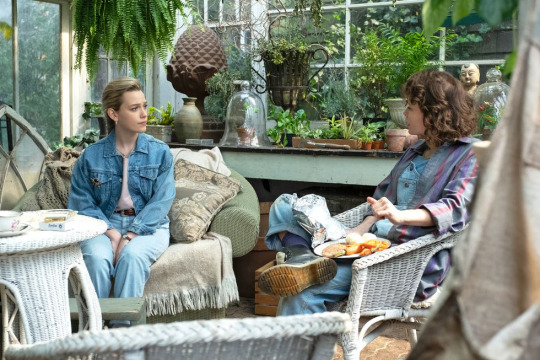
Conclusion
In my writing of this essay—and over the course of the Bly Manor and Hill House rewatches that it inspired—I’ve been finding myself also doing a great deal of reflection about the possibilities and purposes of horror media. I’ve been thinking, in particular, about the potential for the horror genre to provide contained settings in which we can face and explore our deepest fears and traumas in (relatively) safe, controlled ways. Honestly, I think that this is part of why I enjoy Flanagan’s work so much (even if it also enrages me at the same time). If you’ve read this far, you’ll have seen just how profoundly I relate to so much of the subject matter of The Haunting of Bly Manor. It has been extremely meaningful and valuable for me to encounter the show’s depictions of topics like familial trauma, grief, loss, compulsory heterosexuality, caregiving for aging parents, so on, all of which bear so heavily on my own existence. Bly Manor produced opportunities for me to excavate and dig deeply into the worst experiences of and feelings about my life: to look at them, understand them, and give voice to them, when I’m otherwise inclined to bury them into inconspicuous docility.
Even so, the show does not handle these relatable topics as well as it could have. Flanagan and the many contributors to this horror anthology can’t just preach at us about the responsibilities of storytellers; they, too, have responsibilities as storytellers in the communication of these delicate, sensitive, weighty human experiences. And so, to reinforce a point that I made earlier, this is why I’ve written this extensive critique. It’s not because I revile the show and want to condemn it—it’s because I cherish Bly Manor immensely. It’s because I wanted more out of it. It’s because I want to hold it and its creators accountable. It’s because I want folks to think more critically about it (especially after how close I came to unreflectively accepting its messages in my own initial reception of it).
Television usually doesn’t get me this way. It’s been a long time since I was this emotionally attached to a show. So this essay has been my attempt to honor Bly with a careful, meticulous treatment. I appreciate all of the reflection and self-work that it has inspired me to undertake. I’ve wanted to pay my respects in the best way I know how: with close, thorough analysis.
If you’ve read all this mess, thanks for taking the time to do so. I hope that you’ve been able to get something out of it, too.
Representation matters, y’all.
The end.
#the haunting of bly manor#bly manor#thobm#dani clayton#jamie taylor#dani x jamie#damie#sapphic romance#lesbian romance#mental health#compulsory heterosexuality#queer representation#not a fix-it fic but a fix-it essay
86 notes
·
View notes
Text

this is a machine translated and then edited article that is originally in Korean. If you see any discrepancies in the text please lmk and I’ll change it asap. Thanks everyone.
Seoul Milk's "Be Careful with Hand Movements When Opening Yogurt”
Seoul Milk has come under criticism after it was revealed that the company posted a notice asking influencers promoting its new product to "avoid using controversial hand gestures" when opening yogurt containers. Netizens claimed that the "hand gesture" Seoul Milk referred to was the 'pinching gesture (🤏),' which some believe is ‘intentionally used to mock a specific male body part’. They argued that it makes no sense to forbid such a natural and unavoidable movement.


According to a report by The Hankyoreh on the 6th, Seoul Milk recently recruited influencers to promote its new product, "Seoul Milk's Rich Greek Yogurt Soft." One of the promo guidelines instructed influencers to "be cautious of using controversial hand movements when opening the yogurt lid or holding the packaging." This came to light after one influencer made a post about it on social media, which quickly gained attention.
One netizen commented, "Is opening the lid with your fingers really considered a hate expression against men? Why do ordinary people have to be scrutinized for every little action?" Another wrote, "How should I open the yogurt lid then? With my middle finger or by gripping it with my fist?"
Seoul Milk's instructions for influencers have been criticized as excessive, with some accusing the company of censoring even the most mundane hand movements in response to certain men's claims that the 'pinching gesture' symbolizes misandry.
Kim Yuri, the head of the National Women’s Labor Union, told The Hankyoreh in a call, "The company's directive, which forbids a hand gesture that ordinary consumers wouldn't even consider intentional, is irrational." She added, "I worry that Seoul Milk is only incorporating biased messages into its marketing strategy."
As the controversy grew, Seoul Milk said in a call with The Hankyoreh on the same day, "We presented guidelines to block social controversy and focus attention on the product itself," and "We deleted the controversial phrase and revised it on the afternoon of the 5th."
Despite these explanations, public criticism has not subsided. This is not the first time Seoul Milk has been accused of misogynistic promotion, and some netizens are saying they will boycott the company.
In 2021, Seoul Milk faced backlash after releasing a promotional video on their YouTube channel that compared women to dairy cows. The 52-second video featured a woman in white drinking water from a leaf, only to transform into a cow after being startled by a man with a camera.
At the time, netizens criticized the ad for likening women to cows and including scenes reminiscent of illegal filming: "How could such a backwards video be aired in this day and age?" Seoul Milk later issued an apology, saying, "We sincerely apologize to all consumers who felt uncomfortable with the advertisement," and "We will pay more careful attention to prevent similar problems from occurring in the future."
In 2003, Seoul Milk staged a performance in front of the public and journalists, where three naked women were covered in flour and sprayed with yogurt. Four Seoul Milk employees, including the marketing director, were later fined by the court for public indecency.
9 notes
·
View notes
Text
About the situation
ok so i hate addressing drama on here but this feels important.
If this is how you’re learning about the Shubble situation, i apologize
more under the cut
first things first: i 100% stand with and believe Shubble. My heart is with her fully and I’m so glad she’s healing from what she went through with her abuser.
the reason im posting this, though, is because of the discourse surrounding Wilbur Soot and the possibility/evidence that he was the unnamed abuser Shubble was talking about. And as many of you know, i post a lot of crimeboy/sbi/wilbur-centric stuff. For now, because from what i can tell the situation is less than a week old, i’m going to give Wilbur time to respond. I won’t say that it’s him, i won’t say that it’s not him, but i’m prepared for the worst.
As for this blog, i’m probably going to handle this the same way i handled the Dream situation; i’m going to take a break from Wilbur centric aus for the moment until things become clearer, but the odds that i’ll stop writing for his character all together are slim. I don’t write with ccs in mind, ever, period. At this point i’m treating the dsmp cast like OCs with how far removed from their og characters they tend to be in my stories. In all honestly, i stopped watching half of these creators over a year ago, but i still like the idea of their dsmp characters. Hell, to be completely truthful i don’t think i’ve ever watched a Dream or Sapnap youtube video in full and those two are main characters in like half of my aus.
Also clarification just so this doesn’t get misconstrued: when i say “i’m going to handle this like the Dream situation,” i mean i’m gonna keep writing and not take down my previous stories, i’m just going to distance myself from the creator until more comes to light. I don’t want to compare Shubble’s experiences with abuse to fakes snapchat screenshots posted on twitter. Again, I stand with and believe Shubble’s story 100%, abuse is not something to be taken lightly and I wish her nothing but the best. It takes guts to speak out like she has and I commend her bravery.
This situation is a bit harder for me than the Dream one, though, because as I mentioned, i was never a huge cc!Dream fan, more a c!Dream fan. But I’ll be devastated if this is all true because I was a huge Wilbur Soot fan. Never really liked LoveJoy, just wasn’t my type of music, but SootHouse was quite literally the first YouTube channel i ever watched. Not to be parasocial, but Wilbur’s videos got me through some tough times. His YLYL videos were the only things that brought me joy when Techno’s death announcement was released on my birthday. I really looked up to him.
I don’t want to make this about me, the main thing in this situation is to support Shubble. No matter who the ex is, she deserves all of our unwavering support right now. I hope that if it wasn’t Wilbur that he somehow clears his name soon, but that if it was (im hoping it’s not but im not ignorant enough to blindly disregard all the evidence) that he regrets what he did and is getting help. I believe people can change and that everyone deserves a second chance, but im not going to know what to think of him until he gives a genuine, heartfelt apology for his actions, fully commits to bettering himself, and proves that he’ll never do something like this again.
#tw abuse#cyncerity#mcyt gt#mcyt g/t#cynpsa#i’m not gonna tag their names; this post is for my mcyt g/t audience#and if there are aus that include him that y’all are hoping i’ll finish:#hopefully i’ll get to them#i’d hate to leave anything on this blog unfinished#especially with how much time and care went into the stories and with how much love they were shown by you all#and cause i’m a perfectionist and a completionist even if it takes literal years#but mainly the first thing
11 notes
·
View notes
Note
HI CIENE !!!!
i love love love your blog. seriously as a post wc footy fan (disculpe, por favor 💀🙏🏼) im trying to catch up on footy history & politics blah blah. you explain everything so beautifully, like you could rival tifo football on youtube. dead serious.
anyway, i wanted to ask if you could explain the whole neymar tryna sue barça episode bc im clueless there and coolers on twitter dot com are usless. ( not reshad tho !!! he’s so 😍 )
Hello love!! It's so sweet, thank you. I'm delighted to read my years of being shoved down this club's inability to keep finances and politics straight are proving themselves useful. 💀 And never apologize for becoming a footy fan recently; WCs are always wonderful in bringing new interest to the sport, they keep it fresh! Also, Reshad's one of the few Barça sources that usually doesn't get on my nerves, so. Kudos!
Anyways. I don't claim to have all the facts straights because I really don't, I'm just putting out there the very general ideas of what went down and my understanding of them. In today's episode: FC Barcelona, Neymar, Neymar's father, PSG, contracts clauses, and a lotta money. It is, after all, a rich man's world. Buckle up.
2013 : Neymar moves from Santos (Brazilian league) to FC Barcelona (Spanish league). Start of the problems.
See, it wasn’t a regular transfer. Initially, Neymar was set to go to Real Madrid; he’d even already passed medical tests. But Sandro Rosell (Barcelona then-President) bribed Neymar’s agent (his father. Very bright idea.) with some heavy fat checks. Neymar then signed to Barcelona. There were also some other movements which I’ll not get into.
What is important to retain from this is that Barcelona declared, in 2013, that Neymar's transfer from Santos costed FCB €50M (or something akin). But oh, color me surprised, they obviously didn’t declare the various amount of bribes and other money movements that had gone in to deter Neymar’s agent from Madrid and to bring the player to Barcelona.
Cause, ya know. That’s some sketchy stuff. You could also quite boldly say it’s illegal.
That’s where DIS Esporte, a company who “owned” Neymar (meaning : they were entitled to 40% of Neymar’s transfer rights) comes into play. DIS Esporte filed a lawsuit in late 2013/2014, claiming that they indeed had been paid 40% of the €50M declared transfer, but they believed the transfer didn’t cost only €50M (due to the bribes and such), and thus they were entitled to 40% of what the transfer actually costed.
A case was opened – this wasn’t small matter, Sandro Rosell (Barça Presi) resigned in 2014 due to the scandal - and it was finally settled before a judge that the €50M declaration was false, and the real transfer fee was more around the 70M/80M. Oops. Barcelona was eventually charged to pay some millions of compensation to close the case altogether.
Little did they know this was just the first taste of the Neymar financial issues and lawsuits ™.
October 2016 : Neymar signs a renewal contract binding him until 2021 with FC Barcelona. Everything’s happy and shiny, he’s Messi's successor, he's hot and successful, set to help his club win more UCLs, probably snatch a Ballon d’Or or two on the way, and continue to play in a swashbuckling style with his best buddies from Argentine and Uruguay.
The renewal contract includes several clauses, as do all such things, and most notably loyalty bonuses (money the player collects at the end of his contract). The loyalty bonuses of Neymar’s contract are around €43M, and since his release clause is an astronomical €222M, no way he’ll get out of the club lmfao.
July 2017 : Neymar gets out of the club.
In an unprecedented move in the football transfer world which leaves the market value of players forever changed for the worse, it is announced that PSG (French league) paid the €222M release clause with some good ol' Qatari money. The move in itself is subject to sketchy stuff, having been paid to FCB itself and not La Liga, but we're not gonna go into that cause na. Neymar himself announces, via a tearful Instagram video, that he is indeed leaving Barcelona.
Now, by the time rumors of his departure came around in May/June/July 2017, FC Barcelona had already paid €14M (out of the total €43M loyalty bonuses) to Neymar. Upon learning Neymar was actually entertaining the idea to leave, and then upon the actual €222M buying from PSG, the club stops the payment, thus not completing the initially agreed €43M sum, since they consider that, by leaving, Neymar hasn’t fulfilled his loyalty clause and thus isn’t entitled to receive any money from them.
An infamous se queda, some splendid social media trolling, a farewell dinner, the launch of a cold war from the FCB players against the board that was to last several years, some pretty creative insults and a life-time resentment being forged later, it’s August 2017.
August 2017 : Cicadas are singing, Despacito (feat Justin Bieber) is assaulting the eardrums of every unwilling car driver, and Neymar (or Neymar’s side, we don’t know from who the initiative came from) tries to sue Barcelona and ask them for the remaining €29M they claim he is owed from the loyalty bonuses.
FCB immediately respond by suing him back for breach of contract. Though they don’t only ask for him to drop the suing for the remaining €29M, naa. They also ask for him to return the €14M of the loyalty clause that had already been paid to him + 10% for delayed payment of said €14M + €8.5M in damages.
2019 summer transfer window : Amidst everything, Neymar and FC Barcelona reties links.

Funny how quick business relationship can change when it’s in everyone’s benefits.
Neymar wants out of PSG, is even willing to pay himself out from his own pocket, FCB is all the more willing to try and get him back after their spectacular UCL fumble. However, the deal fails, PSG don’t want to let him go, FC Barcelona fall short of a few millions to buy him out, and Neymar stays.
February 2020 : Lo and behold! A wild, shiny new lawsuit has appeared! And guess what? It’s all linked to the messy 2013 transfer from Santos! Just when ya think the skeletons are buried, a closet is kicked open.
Neymar’s side, this time, sues FC Barcelona for contingency payments who helped him move from Santos to FCB: essentially, they want some €7M more. So, you got two cases launched against FCB by Neymar’s side.
June/July 2020 : The cases are presented before a judge in the High Court of Justice of Catalonia. A place Neymar starts to get familiar with. A place Leo Messi also got to know! Ah, football players’ agents and the wonderful, luring world of tax evasion.
Anyways, back to the loyalty bonuses. It’s finally ruled that Neymar has indeed breached his contract, and is therefore ordered by court to pay €6.7M to FC Barcelona.
Oh, wow. Thank God this whole circus is finished.
July 2020 : Neymar’s side appeals.
November 2020 : Now, if you sum up everything that Neymar’s side ask from Barcelona, you get the charming sum of almost €60M.

July 2021 : After many trials and tribulations, it is finally made public by the club that all cases and suing have been resolved amicably between the club and the player outside of court.
Read: huge amount of cash and verbal accords because, presumably, everyone got tired and saw they wouldn’t benefit neither financially nor image wise from the current situation.
And so, they lived happily ever after.
Or till the next summer transfer window.
13 notes
·
View notes
Text
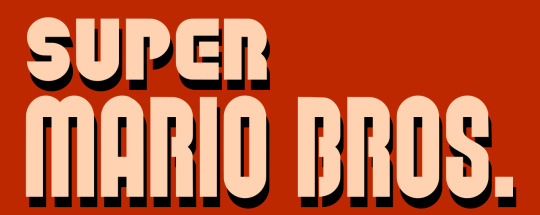
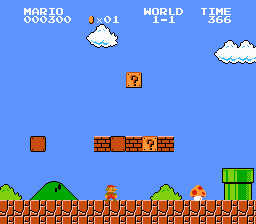
Super Mario Bros. (NES)
Developed/Published by: Nintendo R&D4 / Nintendo
Released: 13/9/1985
Completed: 24/11/2022
Completion: Beat it by warp zoning to 8-1 and then using the continue trick.
Trophies / Achievements: n/a
[Apologies for interrupting, but before we get to the article I’d like to mention that you can pre-order a copy of exp. 2600, my brand new zine, right now and get more of–and help support–writing like what you’re about to read.]
Super. Mario. Bros. Is there a game that less needs anything more written about it? Even I’ve touched on it previously in the form of the (excellent) Super Mario Bros. Deluxe, and I’ve mentioned more than once on this blog the major thing I ever really have to say about Super Mario Bros., which is “ee, isn’t it funny how slippy and inertia-heavy Mario’s movement is? It’s not like a modern platformer at all!” so I should probably just skip that even.
In fact, Super Mario Bros. is such well-trodden ground that I couldn’t really get my dander up for playing the original again, even though I’ve never actually beaten the game in its original, untouched NES form. Because… well…
Am I alone in finding the original Super Mario Bros an incredibly drab looking video game? It’s so… brown. Super Mario Bros. Deluxe brightens things up quite a bit for the Game Boy Color screen, but the original is just so… RF Cable. I can’t think of another way to explain it.
Plus, I think that we’ve all played the first world of Super Mario Bros. so much by now that it doesn’t feel that exciting (especially if you played a bunch of Super Mario 35). Don’t get me wrong–it’s still a masterpiece. But it looks nicer on SNES, it’s richer on GBC… sacrilege it might be, but I think the NES version might be the least interesting version to play, authenticity be damned.
(Plus I was playing it on Switch online, anyway.)
So playing it this time I decided to take a short-cut, considering I’ll only play it again when I get to Super Mario All-Stars: I decided to play it “for real” but just warp-zone my way to the end.
I do not recommend this.
Playing Mario, the original, is a like riding a bike, sure. But the bike is a penny farthing, or or something. It’s not a smooth city bike or something like what I’m used to riding these days. Sure, I get on it, I remember the idiosyncrasies of it’s movement, I walk through the first couple of levels as usual, I get myself to 4-2, I get myself to 8-1…
It’s like taking your penny farthing to a BMX course. You know what to do, but suddenly you’re having to do it exactly right. 8-1, you’re no fool, you remember Mario can run across single block gaps! But then you hit a bit where you need to jump perfectly onto a single block island and not lose momentum or die.
This… will lead to a lot of restarts.
And in 8-2 all hell breaks loose.
I did it, don’t get me wrong. I bloody did it (although I did look up the route for 8-4, and then was pretty lucky to dodge that twatty final hammer bro quite handily both times I had to.) But this betrayed the spirit of this project. Completing a game isn’t about just seeing to the end–if I cared about that, I’d just watch Youtube–it’s about experiencing the game from beginning to end, and playing Super Mario Bros. is about getting on a Penny Farthing in 1-1 and at the end being able to smash that BMX course because the level design has trained you up into it!
It’s a good life lesson, really, if probably also the kind of pat, obvious one you’d expect from an Adam Sandler movie.
I’ll do better next time.
Will I ever play it again? To be honest, I stand by my feeling that this is the least enjoyable version of the game, if only because it’s the most visually boring to me (your mileage may vary). I’ll play through the Super Mario Bros. All-Stars version and this time I’ll do it all the way through properly. My promise to you!
Final Thought: For all my disinterest in seeing this through this time round, I think it’s important to still note the insane context of Super Mario Bros., coming on Famicom as it does after a bunch of absolutely honking releases like Soccer, Ice Climber and the like, with even third-parties just putting out pretty weak sauce arcade ports like Yie Ar Kung Fu and Dig Dug. Things were of course far more interesting internationally on different platforms (A Mind Forever Voyaging! Ultima IV!) but it’s unarguable that the entire world of action games changed the day this was released, and it would take far longer than you’d expect for anyone to catch up–even something as simple as Sega’s Wonder Boy won’t be out in arcades for almost an entire year, and the first Mega Man doesn’t come out till the end of 1987!
Support Every Game I’ve Finished on ko-fi, either via a one-off donation (pay what you like) or by joining as a supporter at just $1 a month. Supporters receive an automatic 35% discount off physical zines, like exp. 2600, which you can order now.
#video games#games#gaming#text#txt#review#super mario bros.#super mario#nintendo#nes#nintendo entertainment system#1985#nintendo r&d4
8 notes
·
View notes
Text
Homestuck Music You Might Not Have Heard
[NOTE: Tumblr's formatting is really finicky so doing dual updates to this thing is not worth my time. If you want the most recent list, find it on Ao3.]
Yes, “MeGaLoVania” and “Time On My Side” are damn good songs, but a music catalogue this large is certain to have several diamonds in the rough. Here’s a selection of likewise lovely Homestuck music that you might not have heard.
V 1.0, updated 2022.10.10
I wrote this as an appreciation for all the wonderful music this comic has, and to give spotlight to the works that aren’t as well-known as “Black” and the like. Homestuck is a truly unique piece of media, and the soundtrack is one of the reasons why.
Great thanks to the HSMusic Wiki, which is what I used to check a track’s artist and contributor credits, whether it had been used in a flash, and what, if any other tracks it referenced. In my write-ups, I try to be as accurate as possible, but I’ve no music education aside from half-remembered childhood violin lessons. Apologies if I make a mistake.
I’m slowly working through the catalogue, so when I listen to more albums I’ll update this.
Full Playlist
Some Vague Guidelines
Official music only on Disc I Side A, with good semi-official unreleased tracks from the Homestuck Sound Test and some fan music on Disc I Side B. Disc II is the same, except in a bulleted list of every track covered, who it’s by, and what album it’s from, for the sake of readability.
The official music section is split into three categories: Deep Cuts From Popular Albums (popular being somewhat arbitrarily defined as Vol. 5, Strife!, Alterniabound, and both coloUrs and mayhem), Lesser-Known Takes on Something Else (for tracks that are well, primarily an interpretation of a pre-existing track, usually something more popular like “Doctor”), and Cool and New Music is for original compositions (though they may have minor references to other music).
Tracks are organized by chronological album release date pre-merger and the Vol. 1-4 re-release, and then by track order within the same album.
Nothing readily available from a Flash (so phonograph tracks and something like “Pony Chorale” are fine) is allowed.
Neither is anything with 1 million views or more (based on the most popular video at time of writing) on Youtube for Deep Cuts, and then for Lesser-Known Takes that threshold is halved, and again for Cool and New Music.
Themes from Alterniabound and the two ColoUrs and Mayhem albums ("Vriska’s Theme", "Green Ghost", "Rust Servant", et cetera) will not be included regardless of popularity because their obvious theming gives them an obvious profile for any fan of what character they’re for.
I will not be covering any albums released after Homestuck Vol. 10.
I want to keep featuring Toby Fox to a minimum – he’s a wonderful musician, but he is also by far the most well known member of the music and tends to overshadow everyone else by a wide margin.
Disc I - Side A
Side A Playlist.
Deep Cuts From Popular Albums
Deep Cuts Playlist.
“Light” by Erik “Jit” Scheele off of Homestuck Vol. 5 is a sort of comfortably adventurous composition that uses 413 as a chord progression. The piano melody that that leads off the track combined with the wind instrumentation gives the feeling of just a wonderful day, helped by the fan art for it in the Vol. 5 track art anthology fan project.
Also off of Vol. 5 , “Softly” by Robert J! Lake is a sweet toned electronic tune driven by a fuzzy, bouncing melody – though the beat gives it just a bit of an edge.
“Atomic Bonsai”, from hard-going solo album Strife! By Joren “Tensei” de Bruin, is the only kid strife track to not get used in some sort of official Homestuck-related thing (“Time on My Side” is a flash track, “Heir of Conditioning” was rearranged into flash track “Heir of Grief” in addition to being a phonograph tune in [S] Kanaya: Return to the Core, and “Dance of Thorns” was used in the Kickstarter video), and that’s a shame. It brings as much energy as the other three, and the combination of bass guitar and East Asian musical influence gives an equally unique sound with hook after hook.
Compared to the effervescence of Nepeta’s preceding music, “Catapult Capuchin” by Toby “Radiation” Fox off of AlterniaBound is nothing but the fierce hunter’s prowess on display in Video Game music fashion, as it was constructed from Mega Man X samples. It’s a high powerful ride throughout, but my favourite part is the bit at 00:33.
“Clockstopper” by viaSatellite and infiniteKnife off of coloUrs and mayhem: Universe B arguably counts for the first category, too, but I’m putting here because it’s specifically a symphonic rock mix of Beatdown, Atomyk Ebonpyre, and Upward Movement. The tension-building intro launching into the full force action of the flying strings always gets my blood pumping. My favourite take on Beatdown so far.
Lesser-Known Takes on Something Else
Lesser-Known Takes Playlist.
Humorous and infectious, “Pony Chorale” by Michael Guy Bowman with Tavia Morra off of Homestuck Vol. 4 is – well, it’s certainly a song! A mournful Western whistle on “Chorale for Jaspers” set to the beat of cartoonish hoof noises, punctuated by cymbals, all wrapped up with one simple word: neigh. And if you want some visuals for your viewing pleasure, there are two (probably not so) secret Flash pages for this song.
“Squidissension” by Mark Hadley, off of Homestuck Vol. 6 does an admirable and unique spin on the difficult job of combining the hyper-pop sugar-overdosed “Squiddles!” theme and the slightly ominous guardianstrife theme for Jade, “Dissension”. Serving as the main running melody, when shifted into minor key and given “Dissension” as a complement, “Squiddles!” becomes frantic instead of desperate, while “Dissension” is given that extra jump in momentum to keep pace, making for a track that’s something different, more adventurous, and more dire than either of its progenitors.
While it’s close to blowing the 500k Youtube requirement, “Anbroids 2.0” by Malcom Brown off of Homestuck Vol. 9 is still in the clear, so I’m putting it here as an early favourite of mine. With a very synthetic Strider sound, the track’s got a nice bouncy melody that serves as a fuller-realized version of the original “Anbroids” in the flash. Perfect for a rap-off.
“I’m a Member of the Midnight Crew (Post-Punk Version)”, by Michael Guy Bowman with Erik “Jit” Scheele and Marcy Nabors, from Homestuck Vol. 9, is a seedier, sharper, and stabbier take on the Victorian original and the acapella cover featured in the comic proper. The vocals just kill.
“II – Sarabande” by Clark “Plazmataz” Powell for her solo album Symphony Impossible to Play , is, unsurprisingly, a symphonic cover of “Sarabande” by Erik “Jit” Scheele. What might be surprising, however, is how much restraint is employed in it – the difference from the original is subtle, bearing a slowly rising string backing before the cello solo of the main melody kicks in around the minute mark.
Where “Homestuck Anthem” has a weird, portentous and artificial atmosphere, “Homestuck” a more present and traditional rendition, “Elevatorstuck” a dedicated – and listenable! – parody of muzak, and “Homosuck Anthem” a… copious amount of animal sound effects, “IV – Anthem”, also off of Symphony Impossible to Play brings a triumphant fanfare to the thematic melody for the comic. It is powerful and keeps the tension in the original throughout, driven by the backing – my favourite part is when the brass first cuts and you’re just left to bask only in the beat and the strings. “I – Overture” might have been the track to finish the comic, but I can’t think of a better track to end the album.
While the popularity of “Penumbra Phantasm” is debatable given that it’s never been released in full, “FantasyP”, by Erik “Jit” Scheele off of his solo album One Year Older, is a wonderfully hopeful and free take on “Penumbra Phantasm”, instead of referencing it as part of a larger composition. If you don’t know what “Penumbra Phantasm” is, prepare for roughly four minutes of “hey, that sounds familiar” while listening to just a really nice song – though, notably, it omits that one haunting piano riff from the original that serves as a code for a great many of the flashes. (One Year Older is available for free on Scheele’s bandcamp.)
“Another Chance”, a bonus track from One Year Older but done by Eston “silence” Schweickart”, is a synth remix of “Walk-Stab-Walk (R&E)” that gives the already good track some serious extra juice.
Starting off as a far-off sounding piano rendition of “Ruins” before crackling into a mechanized-backing of “Flare”, then bringing in clear, present electric guitar at 2:00 and finally adding in “Explore”, “Solar Voyage” by Marcy Nabors (with several others, check Disc II for full credits) off of Homestuck Vol. 10 definitely feels like a journey. The twists and progression on these recognizable musical staples are a sound to behold.
“Conclude” by Seth “Beatfox” Peelle, also off the same album, is the closer to the final volume of Homestuck music, and it lives up to the challenge. Beginning with a flying rendition of Sburban Jungle that turns the frenetic rush of the original into a hopeful retrospective, before switching to a bittersweet refrain of “Showtime”, the song then dives into original territory with a fanfare at 4:13, backed by “Skies of Skaia”, before closing with a soaring rendition of “Homestuck”, free and full of light in comparison to the pounding might of “IV – Anthem”. It’s a wonderful encapsulation of the complicated feelings flowing into one another that come with the end of a comic that means so much. My favourite bit is the far-off echoed “Showtime” at 1:19 – looking at the early morning of that April 13th, 2009. It did turn out to be a very long day, after all.
Cool And New Music
Cool and New Music Playlist.
“Squiddle Samba” by Michael Guy Bowman off of the album Squiddles! (no longer for sale, do with that information what you will), a thematic concept theme giving a whole extensive soundtrack to a fictitious children’s television show, is an energetic and bubbly jam that does not take the concept so far that an excess of irony is needed to enjoy it (though, the sugarily crystalline Squiddle voices appear for a scant fifteen seconds near the end, if that’s what you’re for).
Also off the same album, “Ocean Stars” by Mark Hadley is a calming, sweet and savoury treat to top off the excess of sugar cubes (and occasion tentacles) put on your musical plate. The layered build-up of the various elements is simple, befitting a children’s show, but done oh-so-well in a way that gives it meat.
“The Lemonsnout Turnabout” by Toby Fox for his solo album Alternia is a narrative piece wherein a young Trollian girl has an intrumental motif established (Neo-baroque harpsichord), and sets to take in a certain neon yellow draconian senator (represented by an oboe) for adjustments. In contrast to “Terezi’s Theme” and its more faster action, there’s a certain cerebral, well-plotted atmosphere to “The Lemonsnout Turnabout”. You can see the wind-up of the machinery fueling Terezi’s long noose in nailing Lemonsnout, echoed by the fearful groan of that oboe and the sharp jabs of the harpsichord in turn.
Also from Alternia, “dESPERADO ROCKET CHAIRS,” establishes Tavros with a Latin theme the way “The Lemonsnout Turnabout” establishes Terezi with the harpischord. It begins a short intro, before the horns really come in blaring – a far shot from the dying string reference of “Rex Duodecim Angelus”. Tavros is a dork, but he’s got fire behind him, and “dSPERADO ROCKET CHAIRS,” does a good job of showing that.
“Shade” by Clark “Plazmataz” Powell off of her solo album Medium, themed around the kid’s lands. A mixture of synthetic and often industrial noise combined with more organic instrumentation helps express the strangeness of these game worlds. In “Shade”, the shimmering melody that drives the track forward expresses the quiet and curious nature of the bioluminescence of LOWAS, before transitioning into a piano tune made for Typheus.
“Heat”, off the same album, takes a more hard-pressed approach, utilizing scissoring violin backdropped against industrial swirl to conjure up the swelter of churning lava in LOHAC. When the violin breaks free of that rhythm to climb, it only adds to the drama, and the song ends by sonically pulling away from the ebb and flow to leave the planet behind.
Starting off with thunder, “Exodus” by Tyler Dever for his solo album Sburb and performed by Erik “jit” Scheele, Exodus balances the apocalyptic severity of the meteors sent during the beginning hours of SBURB with skittering notes of the various players attempting to enter the medium. It closes out with a stark, last-second rendition of “Sburban Jungle” before quietly fading. (Sburb is available for free on Dever’s bandcamp.)
“Carapacian Dominion” by Seth “Beatfox” Peelle, opening the exile-themed album The Wanderers (also unavailable for purchase), sets the stage for the rest of the music by combining more unexplored, ethnic sound with a more Homestuck-typical industrial beat that’s perfect for the long trek along the desert of earth, years in the future (but not many).
In contrast to the forward-hiking rhythm of “Carapacian Dominion”, “Aimless Morning Gold” by Michael Guy Bowman off the same album is a track for staying in one place. Glittering synth (?) notes linger and warp in the heat, contrasted by the lazy ramble of the bass, all punctuated by a slight turn to Westerns with rattling machine gun shots.
And taking a strong turn from both of them, “Years in the Future” by Robert J! Lake, still off of the same album, is track following in Lake’s style of slightly eclectic, slightly choppy, but nevertheless catching and catchy electronic noise tunes. It takes a bit for the track to get going, but the combination of blips and bleeps that all call up the idea of electronic communication in the Can Town of the future makes for a wonderful swirl in the end.
“Derse Dreamers” might be one of the most famous songs in Homestuck, but that isn’t to say Prospit is lacking in terms of good music. “Center of Brilliance” by Solatrus for his solo album Prospit & Derse, themed around, well, you guess, begins with a shimmering chiming intro before bass and piano step in to bring a more full view of the center of the golden moon. The regal fanfare and drum setup ties things to Prospit’s formal atmosphere as a contrast to John and Jade’s instruments of choice. Something I like for all of the Prospit songs in the album is the bass guitar – it stands out as a driving instrument rather than just backing, and it’s true here, too. (Prospit & Derse is available for free on Solatrus’ bandcamp.)
“Song of Skaia” by Mark Hadley with Tarien Ainuvë, off of the same-titled album, is probably most recognizable as the bursting upswell chorus three minutes into “Creata”. Compared to that triumphant recital, however, “Song of Skaia” takes a more singular approach. It’s more minimalistic, and generally has the feeling of looking down from a thousand miles out in space.
“Cancerous Core” by Erik “Jit” Scheele gives a very short moment in the comic – the descent into Skaia – a full musical backing. The subtle brush of the air in combination with the restless roll of the piano in Locrian mode, accompanied by the ancient call of the wind instrumentation. It’s a track that definitely calls a strange and perhaps unsettling journey into some unseen world.
Alien and enchanting, “Voidlight” by Thomas Ferkol off of Homestuck Vol. 10 bears a flowing atmosphere that still contains a sense of drama. From commentary, it’s based on Calliope hiding in the Furthest Ring, which makes sense for the quiet not yet calm nature. The strings in the intro help convey the quiet, secluded landscape, and all around it’s a wonderfully ethereal piece.
“Feel (Alive)” by Luke Benjamins and Robert J! Lake from the same album, on the other hand, is a straight up chiptune rocker. It’s got raucous energy that absolutely earns its title.
Disc I - Side B
Side B Playlist (incomplete, not every track is on Youtube).
Homestuck Sound Test Gems
Sound Test Playlist (incomplete, not every Sound Test track is on Youtube).
“Cuttlefish Rag” by Alexander “Albatross Soup” Rosetti is a jaunty little ragtime tune originally written for Squiddles! , though you could also easily interpret it as a track for Feferi.
All memery aside, “Karkalicious (Guitarkind)” is a rockin’ guitar addition to a short excerpt of the Broadwaystuck classic. Yes, it’s hilarious. It also has some genuinely sick riffs. I daresay “Karkalicious” has never sounded so good.
“Mother (Davekind)” by Erik “Jit” Scheele is a take on “Mother” from One Year Older (can you tell I really like this album?) but in the style of Dave instead of John, trading out the slow, matured piano and strings for synths and turntables with a more energetic beat.
“Sea of Derse” got more instrumentation for the jazzy and relaxed “Breeze” in Homestuck Vol. 10, but in some ways I like the slightly more melancholic, stripped-down piano original.
“today i butchered a homestuck song (three in the A M)” by James “soselfimportant” Roach is a slightly weird, catching arrangement on “Three in the Morning”. In some way, it’s a precursor to what Roach did with “Karkat’s Theme”, “Terezi’s Theme”, and “Davesprite” for the Pesterquest soundtrack.
“Aggrieve (Piano) v2” by Toby Fox is… well, it’s a piano arrangement of “Aggrieve”, the second of three, and the best of them. I might be biased in terms of instrumentation, but what makes this track so good personally (and in fact, my favourite version of “Aggrieve”) is that it brings a level of energy that tends to be sublimated for a more measured and cerebral Lalondian pace – even in “Aggrievocation”. There’s a lot of great moments in this track, but my favourite bit’s around 1:42.
Fan Music Gems
Fan Music Playlist (incomplete, not every fan music track is on Youtube).
Found in the ~2011 Fan Music compilation of the Homestuck Archives, “Sunrise” by Yan “Nucleose” Rodriguez is a cheery guitar cover of the previously mentioned “Light”. It brings a sharper edge to the main melody, definitely befitting those first cracks of light over the horizon. I might like this more than the original. (Ironically, a later track by Scheele for One Year Older used the same title, and also referenced “Light”.)
“Sunshaker” by D. Crystal off of Land of Fans and Music is a very faithful jazz arrangement of “Sunsetter”. It’s mellower than both “Sunsetter” and “Sunslammer”, but still upbeat, all pinned together by that rolling piano.
Done by “Tarranon” for the concept album Sburb OST, “Amongst Smiling Faces [Prospitian Dignitaries]” is a theme for the agents of the Prospit. As its title might suggest, it takes a much more relaxed tone than Prospit & Derse’s regality, going downright pastoral with a sound not out of place for a first town in a JRPG.
“Waste of Space” by therosielord off of Songs for Monsters , is a lamentful fansong for Jade H arley on the occasion of her death in the Game Over timeline. The lyric s have some really clever moments underscoring Jade’s rise in agency, only to see that same agency fall by the wayside through death and grimbarkification. The ambling, almost slee py guitar backing only underscores the tragedy. (“Waste of Space” is the first of a quartet of songs for the Beta kids – the girls’ featured on Songs for Monsters , and the boys’ featured on Songs for Gods .)
The third in the Beta Kids quartet by therosielord and off of Songs for Gods, “Out of Time” is a fansong for, of course, Dave Strider. It’s a rambling, wordplay-laden tune that’s set to the relentless pace of Sburb on a single day in April, before scratching and resetting to a layered repetition of information and elements. The verse at 2:12 is my favourite of all of the Beta kid songs.
The twelve fansongs for the trolls might be PhemieC’s most famous contribution to Homestuck fandom, but the songs off of their other album, Songs for a Doomed Timeline aren’t slacking, either. “The Path” is one of their less well-known works – a fansong for Alpha Dave and Rose. Prognostic and methodical, it’s sung with the unclouded and heavy knowledge of the events to come, and the lyricism is sharp at every corner.
Yeah, I’m waiving the no character themes rule for Fan Music, because Fan Music is already niche enough. “♐Broken Strings♐” by psithurist off of Ancestral , an album dedicated to the ancestors, is an off-beat math rock styled string track for E%ecutor Darkleer. The odd rhythm and combination of strings and percussion is perfect for the loyal agent of the empire turnt exile.
“Of Rust and Royalty” by Grace Medley and off of the same album is a thudding nu disco take on the fight between the Handmaid and the Condesce, splicing up various elements of Rust Servant/Rust Apocalypse, Fuchsia Ruler, and Eternity Served Cold in a way that sells the power of the two (three?) individuals involved.
“The End of Something Really Excellent” by Rhyselinn off of Lands of Fans and Music 4 is, itself, a r eally e xcellent medley of “ The Beginning of Something Really Excellent” and a lot of narrative Homestuck hits. The tone is mostly relieved and a little nostalgic, like finally being able to catch a real breath after two very long days and three years of a suspense-building in-between – a nice contrast to the more triumphant and energetic musical recaps in Homestuck. The commentary has both and outline of how the song follows the plot of Homestuck and timestamps for each song referenced.
“Calming Quartz” by PoisonedElite is the opener for Xenoplanetarium, an album in a similar vein as Medium, only for the trolls’ planets instead. Whereas Medium touches on the at least tangential familiarity that comes with the kids’ planets by utilizing industrial sounds with organic instruments, Xenoplanetarium at its best gives an odd and isolated soundtrack to its subjects, and “Calming Quartz” is exemplary in that. The bounding piano reflects the glacial nature of the quartz in LOQAM, backdropped by music box melody fitting with the cardinal movement. That melody’s isolation and eventual fade into mechanized hum at the end might be my favourite part of the song.
Continuing in the steed of “Calming Quartz”, “Sandy Skyline” by Aris Martinian from the same album brings the ever-stretching dunes of LOSAZ with some notes in the breeze and strong low stringwork, set to a clicking rhythm. The echo processing effect is noticeable but not too excessive, all making for a track perfect for that orange expanse.
Disc II - Side A
Side A Playlist.
Deep Cuts From Popular Albums
Deep Cuts Playlist.
“Light” – Erik “Jit” Scheele (Homestuck Vol. 5)
“Softly” – Robert J! Lake (Homestuck Vol. 5)
“Atomic Bonsai” – Joren “Tensei” de Bruin (Strife!)
“Catapult Capuchin” – Toby “Radiation” Fox (Alterniabound)
“Clockstopper” – viaSatellite, infiniteKnife (coloUrs and mayhem: Universe B)
Lesser-Known Takes on Something Else
Lesser-Known Takes Playlist.
“Pony Chorale” – Michael Guy Bowman with Tavia Morra (Homestuck Vol. 4)
“Squidissension” – Mark Hadley (Homestuck Vol. 6)
“Anbroids 2.0” – Malcom Brown (Homestuck Vol. 9)
“I’m a Member of the Midnight Crew (Post-Punk Version)” – Michael Guy Bowman with Erik “Jit” Scheele” and Marcy Nabors (Homestuck Vol. 9)
“II – Sarabande” – Clark “Plazmataz” Powell (Symphony Impossible to Play)
“IV – Anthem” – Clark “Plazmataz” Powell (Symphony Impossible to Play)
“FantasyP” – Erik “Jit” Scheele” (One Year Older)
“Another Chance” – Eston “silence” Schweickart (One Year Older)
“Solar Voyage” – Marcy Nabors with Michael Guy Bowman, Clark “Plazmataz” Powell, Erik “Jit” Scheele”, Joren “Tensei” de Bruin”, Paul Henderson, and Jamie Page Stanley (Homestuck Vol. 10)
“Conclude” Seth “Beatfox” Peele (Homestuck Vol. 10)
Cool and New Music
Cool and New Music Playlist.
“Squiddle Samba” – Michael Guy Bowman (Squiddles!)
“Ocean Stars” – Mark Hadley (Squiddles!)
“The Lemonsnout Turnabout” – Toby Fox (Alternia)
“Desperado Rocket Chairs” – Toby Fox (Alternia)
“Shade” – Clark “Plazmataz” Powell (Medium)
“Heat” – Clark “Plazmataz” Powell (Medium)
“Exodus” – Tyler Dever and Erik “Jit” Scheele” (Sburb)
“Carapacian Dominion” – Seth “Beatfox” Peele (The Wanderers)
“Aimless Morning Gold” – Michael Guy Bowman (The Wanderers)
“Years In The Future” – Robert J! Lake (The Wanderers)
“Center of Brilliance” – Solatrus (Prospit & Derse)
“Song of Skaia” – Mark Hadley with Tarien Ainuvë (Song of Skaia)
“Cancerous Core” – Erik “Jit” Scheele (One Year Older)
“Voidlight” – Thomas Ferkol (Homestuck Vol. 10)
“Feel (Alive)” – Luke Benjamins and Robert J! Lake (Homestuck Vol. 10)
Disc II - Side B
Side B Playlist (incomplete, not every track is on Youtube).
Homestuck Sound Test Gems
Sound Test Playlist (incomplete, not every Sound Test track is on Youtube).
Cuttlefish Rag – Alexander “Albatross Soup” Rosetti
“Karkalicious (Guitarkind)” – Joren “Tensei” de Bruin
“Mother (Davekind)” – Erik “Jit” Scheele
“Sea of Derse” – Erik “Jit” Scheele
“today I butchered a song (3 in the A M)” – James “soselfimportant” Roach
“Aggrieve (Piano) v2” – Toby “Radiation” Fox
Fan Music Gems
Fan Music Playlist (incomplete, not every fan music track is on Youtube).
“Sunrise” – Yan “Nucleose” Rodriguez
“Sunshaker” – D.Crystal (Land of Fans and Music)
“Amongst Smiling Faces [Prospitian Dignitaries]” – Tarranon (Sburb OST)
“Waste of Space” – the rosielord (Songs for Monsters)
“Out of Time” – therosielord (Songs for Gods)
“The Path” – PhemieC (Songs for a Doomed Timeline)
“♐Broken Strings♐” – psithurist (Ancestral)
“Of Rust and Royalty” – Grace Medley (Ancestral)
“The End of Something Really Excellent” – Rhyselinn (Land of Fans and Music 4)
“Calming Quartz” – PoisonedElite (Xenoplanetarium)
“Sandy Skyline” – Aris Martinian (Xenoplanetarium)
#Homestuck#Homestuck Music#Playlist#Writing#Homestuck Music Recs#Music Recs#Andrew Hussie's Earthbound Fanfiction
33 notes
·
View notes
Text
KOKIA round-up: March 14-18, 2023
Once again, I’ll have to resort to providing summaries instead of full translations for KOKIA’s blog entries. My apologies and thank you for your continuous patience. I’ll also include updates from YouTube below to round out the news from this week. - KOKIAfans admin

In her blog entry of March 14, KOKIA informs the members of her fan club ancoro that the people who got selected for her ‘25th anniversary celebration’ have received a message telling them they won. She does feel very sorry for those who missed out and hopes she’ll get to meet them somewhere else soon.
In her entry of March 15, KOKIA reveals one of her career dreams is coming true in her 25th anniversary concert next month. Musician and violinist Norihiro Tsuru is joining her band as a ‘sound ranger’ for the concert. She holds him in high esteem and is very excited to share this news. He also did work for Nesia no tabibito (’voyagers of Nesia’), for which KOKIA got to perform the theme song, and Karakurizoushi Ayatsuri sakon ('Doll puppeteer Sakon'), for which KOKIA performed the song Sayonara wa iwanaide (’don’t say goodbye’). She’d only just debuted back then, and she thought she was a hundred years too early to invite Tsuru to perform with her, but it only took 25 years in the end. Ayako, who has been playing with Tsuru for many years, will also join on cello. The concert will probably have some charming violin arrangements, so stay tuned!

Today, KOKIA held her last of the monthly viewing parties on YouTube, this time showing her 2012 concert ‘History’. In the chat, she announced that the pamphlet for her 25th anniversary will have 32 pages. She’s thinking of selling them via the web shop too as well as at the venue, and it will be bilingual, in both Japanese and English.
Since this is her last chance to ask in the chat, she mentions how tickets for April 27 are still available for purchase via livepocket.
She feels that the feelings of the History concert are connected to her 25th anniversary concert, and she’s looking forward to April 1, when she’ll be able to meet her audience in real life at Yatsugatake Kogen Music Hall. Thanks for joining these free streams!

Finally, if you check KOKIA’s official YouTube page now, she’s quietly uploaded some of her old promotional videos in higher quality (1080p HD), previously released under Victor Entertainment. They are:
The power of Smile (2003)
Otona no ookami (’adult wolf’) (Live at Tokyo International Forum Hall C, May 22, 2011)
so much love for you ♥ (2004)
Ai no melody (’melody of love’) (2006)
Yume ga chikara (’dreams are strength’) (2004)
dandelion (acoustic) (2005)
time say goodbye (duet “KOKIA & piano”) (2005)
Kawaranai koto ~since 1976~ (’things that won’t change’) (2003)
Remember the kiss (duet “KOKIA & piano”) (2003)

#KOKIA#KOKIA 25th anniversary countdown#25th anniversary concert#promotion: videos#promotion: youtube
4 notes
·
View notes
Text
❝ 𝗟𝗼𝘃𝗲 𝗜𝘀 𝗟𝗶𝗸𝗲 𝗕𝗲𝗶𝗻𝗴 𝗙𝘂𝗰𝗸𝗲𝗱 𝗪𝗶𝘁𝗵 𝗔 𝗞𝗻𝗶𝗳𝗲❞ — ♚/♟
—— a rex / reboot playlist —— @not-another-parable
cw: explicit
— YouTube | Spotify —
The Red Means I Love You - ♚/♟
Cause my insides are red and yours are too
And the red on my face is matching you
And goodness you're bleeding
What a wonderful feeling
Stalker's Tango - ♚/♟
Love me, love me, love me, love me, love me, love me, love me, love me
Love me, love me, love me, love me more than you possibly can
Whiter / Straighter - ♚
Can I make you see how weak you are and make you feel the same?
Since I have the floor, I'll take this time to promise you one thing
That I'll be damn sure when you close your eyes
That all you see is me
The Wolf - ♚
I'm out of my head, of my heart and my mind, cause you can run, but you can't hide
I'm gonna make you mine
Out of my head, of my heart and my mind, cause I can feel how your flesh now is crying out for more
Bad Romance (Cover) - ♚/♟
I want your horror, I want your design
Cause you're a criminal as long as you're mine
I want your love
Love, love, love, I want your love
Anti Social Masochistic Rage (ASMR) - ♟
I guess you gave me a little surprise in my drink
Stumbled through the hall and hit my face on the sink
Woke up in a panic and unable to see, the pain intensified consequently
Haven't I been such a good good boy?
Haven't I been such a good good boy?
The House Is Alive and The House Is Hungry - ♚
I love you, do you love me?
Let's set our hair on fire
Let's twist our bodies down over coals
Let's give them something they can't ignore
Let's cast a mirror right back at fear
Let's show this world we were here
Little Jars of Blood - ♟
I'm tasting blood on my fingertips, it's not healthy how much I am used to this
I want to break my legs, so you can take care of me instead
And I will never run away cause god I want to stay with you
Flowers of Flesh and Blood - ♟
Close my plastic eyelids
You say this is the love we all hope to find
So don't cry, don't worry
You're supposed to bleed the first time
He Loves Me (He Loves Me Not) - ♟
I won't apologize, I miss the scared look in your eyes
When I said, I'll always follow
Where you are is where I will go
Tell me truth, what would you do? If I told you 'I'm coming to find you'
Oleander - ♟
I make a mess and you'll be there to help me undress
I'll be unclean, I'll be obscene, you'll be the rest
And if you leave me
Rest assured, it would kill me
Your Body, My Temple - ♚/♟
Please relieve me of my dreaming, I’m kneeling, begging, pleading for my savory-sweet release of death
Oh, I wanna die, I wanna die, I wanna die, I wanna die, I wanna die, I wanna die, I wanna die
So I can taste your name on my final breath
You Can Be So Cruel - ♚/♟
Killing me so gently, hands wrapped round my throat
Choking me so slowly, slicing every word down to the bone
Cause you can be so cruel and that's all I've ever known
The White Powerless - ♚
I can cherish and hold each abdominal toll, joyless cold
Can you cherish and hold every original misconception of my soul?
Yeah, best check your hands for missing fingers once I've shaked them
I got oceans of insanity, I got mountains of profanity
I got spoonfuls of the irony all for you
Just let me in
— Honorary Mentions —
Red Flags
The date started off so well
Begin my night not expecting the fright of my life
He was perfect from what I could tell
How could I not see the danger right in front of me?
You Tied Up My Heart
Let go of this grip on me!
You tied up my heart, you tied me down
Now break me open with your love and mercy
2 notes
·
View notes
Photo
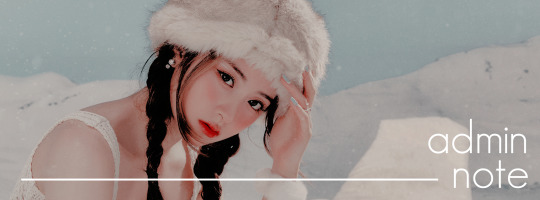
apologies for being a bit absent on the main this past week. during this time, i was working on some updates that are now up and ready. i’ll keep this as brief as possible, so below the cut are a few group, points shop, and rules updates!
group updates
due to the current situation with loona with lawsuits and fan boycotts, i decided it was probably best to reimagine arcadia without loona. this has resulted in an updated version of arcadia with aespa, everglow, and nmixx in its model discography. the group has a very similar place in the universe as it did before, but with the storyline of “next level” becoming a viral hit last year and the group trying to maintain their increased popularity.
as everglow was moved over to arcadia, there have been some tweaks to ultraviolet as well. they’ve been renamed femme fatale but changes have been pretty minor. there was some tweaking of release dates, the addition of le sserafim as a model group for future releases, and some tweaking of positions in order to accommodate this addition. their biography has been updated as well.
nct dream has been added to cloud’s model discography. this resulted in some discography and biography tweaking and an earlier debut date of 2016.
i believe all muses who were affected by these changes were contacted last week and any claims that need to be altered will be updated accordingly as i hear back from those muns. if i somehow missed you, please do contact me as soon as possible!
points shop updates
a few updates have been made to the point shop. a few prices have been altered and a few claims have been moved around or formatted differently. two new categories have also been added: business & industry and visual & creative direction.
business & industry includes claims like original brands, restaurants and cafes, and book releases, many of which have been suggested via the suggestion box over the years. you can now also find the collaboration collection claim under this category. the former original apparel line claim has merged into the original brand launch claim.
visual & creative direction allows muses to make claims (partially) participating in creative direction for their own group, such as concept direction, styling direction, and album design. it also allows muses to make claims for directing music videos.
for now, both of these sections are considered to be experimental, so major and/or minor changes may be made to them in the future, such as potentially splitting one section into two different sections, after i’m able to see how they actually work in action. neither of these new sections can be claimed as specialties at the moment, after seeing how these sections work in action, they may be added as potential specialty claims as well.
claims now also list any and all specialties that can be applied to them under the claim itself. along with this, some claims can now fall under more than one specialty. for instance, a standalone commercial can have the acting or fashion & modeling specialty used on it and a youtube video can have a specialty applied on it if said specialty is relevant to the content.
there were some minor tweaks made to claims rules as well with the purpose of expanding possibilities, such as the acting role range from the muse’s age being upped from three years to five.
rules updates
muns may now revamp their muse after nine months since the last time they revamped the same muse if they necessary without having to wipe all of their claims and points. similarly to face claim changes, this is in addition to the initial one free revamp after acceptance which does not have a required waiting period. the time period may be tweaked in the future if necessary, but i understand certain parts of a muse written one way can eventually impede inspiration for that muse down the line if the mun’s vision for them changes too much, so i do want to make it a little easier to try to remedy that as long as it’s not happening so frequently it causes confusion for other muses.
final note:
as i try to do whenever more major updates are made, any mun who finds it may be beneficial to revamp their muse based on these updates, whether that is because updates to a group made that group more fitting or they want to redo their muse’s established claims in light of points shop additions or price updates, is welcome to a free revamp until the end of march. (note: using this revamp will reset the nine month waiting period before another revamp is possible, but it does not have to have been nine months since the last revamp to use this free one.)
that said, in a coming post, i plan to open up anything that muses did not previously have the chance to claim as established career claims or points shop claims so that muses may claim them with points retroactively for a short period. this would apply to claims related music claims newly added to past discographies, as well as creative & art direction and video direction claims in general. more information about that will come at that time, so if any of those would be the main drive for revamping, i would suggest waiting until more details about that are made available to decide whether you want to use the revamp or not.
3 notes
·
View notes
Note
hi hi sorry to bother, but can u explain me what’s going on with lucas? I genuinely though he got kicked out bc he got exposed for sleeping with a girl which I thought was ridiculous back then (I was an nctzen) and I haven’t really looked into it or heard of him until now
hii!!! it’s not a bother at all!! i’ll try and summarize quickly what happened w him, but since this is a shallow explanation, i would recommend u reading this reddit thread since i think it’s the most detailed one (even though, in my opinion, it is sometimes biased)
tw! : sexual assault / mentions of sex, emotional manipulation, suicidal thoughts, eating problems
on 24/08/2021, lucas was accused of cheating, emotional manipulation (gaslighting), sexual assault and forcing sex without protection, from three girls, the first comment starting on twitter and going to weibo. most of the three girls had ‘proof’ on him. some had wechat screenshots, fansign receipts, audios... and after all that was released, a fourth girl, who claimed that she was once his fwb, showed up with pictures of him. there were people debunking the proof offered by the first three, but this fourth girl’s pictures of lucas weren’t debunked since they were most likely real.
due to that, his song with hendery had the release suspended, he had to release an apology, and was put on a hiatus by sm (and removed from superm, nct and wayv). sm being the amazing company it is didn’t release any official statements on the whole situation, and left his fans in this whole spiral of not knowing if the rumours were actually true. but nevertheless, people started sending him hate, death threats, and saying all the worst things to him.
last year, sm announced his solo promotions, along with his removal from the groups, and this year, almost 3 years after the controversy, a short documentary was released, adressing the whole situation in a very poor manner.
he talked about how he locked himself in his room and couldn’t eat, had his hair falling out in chunks and had suicidal thoughts. but, still, lucas ended up “confessing” that he did do what the accusations said he did, but not fully specified WHICH were true and which weren’t.
screenshots i just took from his documentary FREEZE, pt. 1, which you can watch on youtube, to show what he said




in my opinion now (talking about the documentary), i genuinely think that sm only did that to try and clear up his image a bit, especially with international fans, before the release of his solo album as to not make it so sudden. though that only worked as backlash, because it confirmed very badly that he sexually assaulted the girl(s) and didn’t clarify the accusations. it only worked to worsen up the situation.
because of that, even though he says that he has changed and is sorry, he still confirmed his actions, and even apologizing, the damage was done to the victims. and due to this, i can not defend a person who, in any way, abused physically and mentally of anyone and don’t want anyone who defends him following me
0 notes